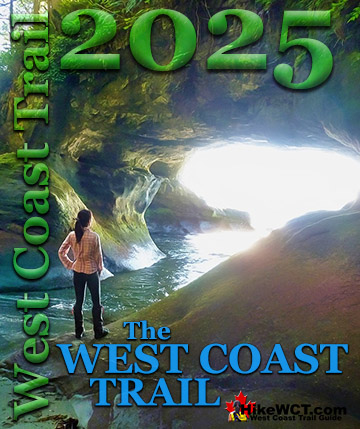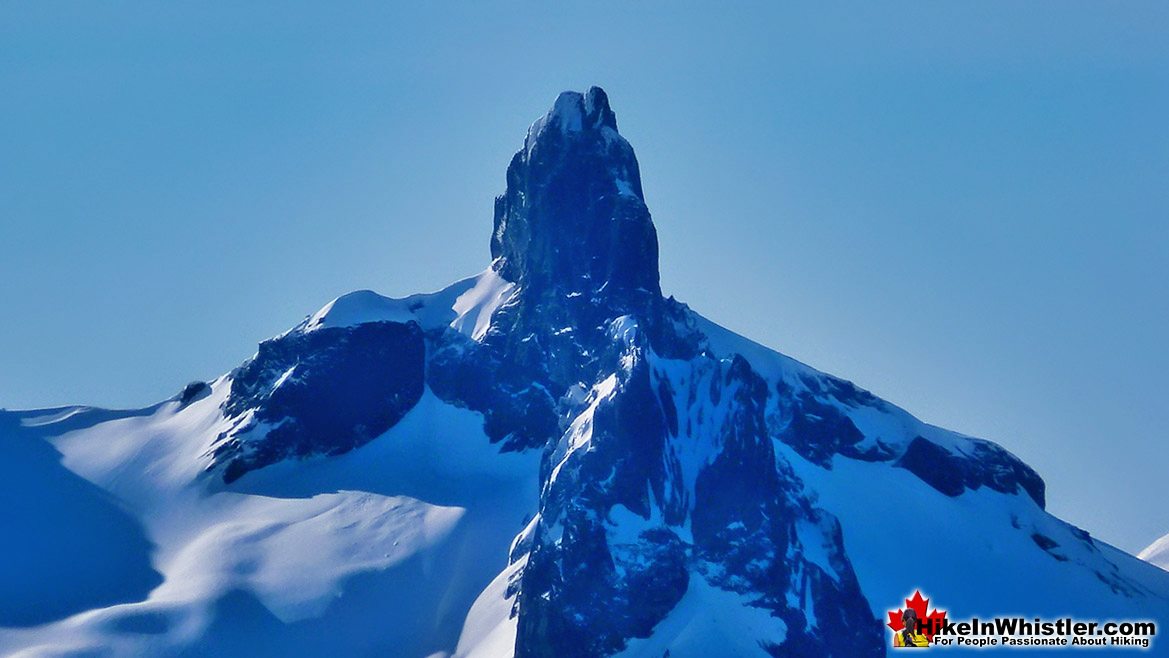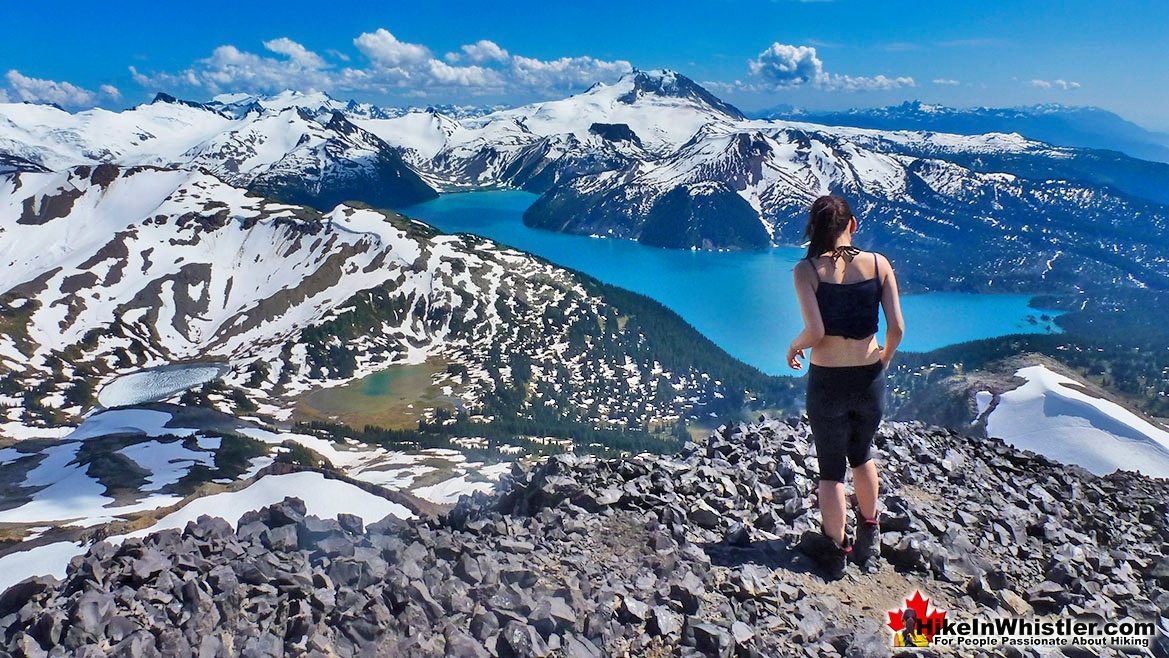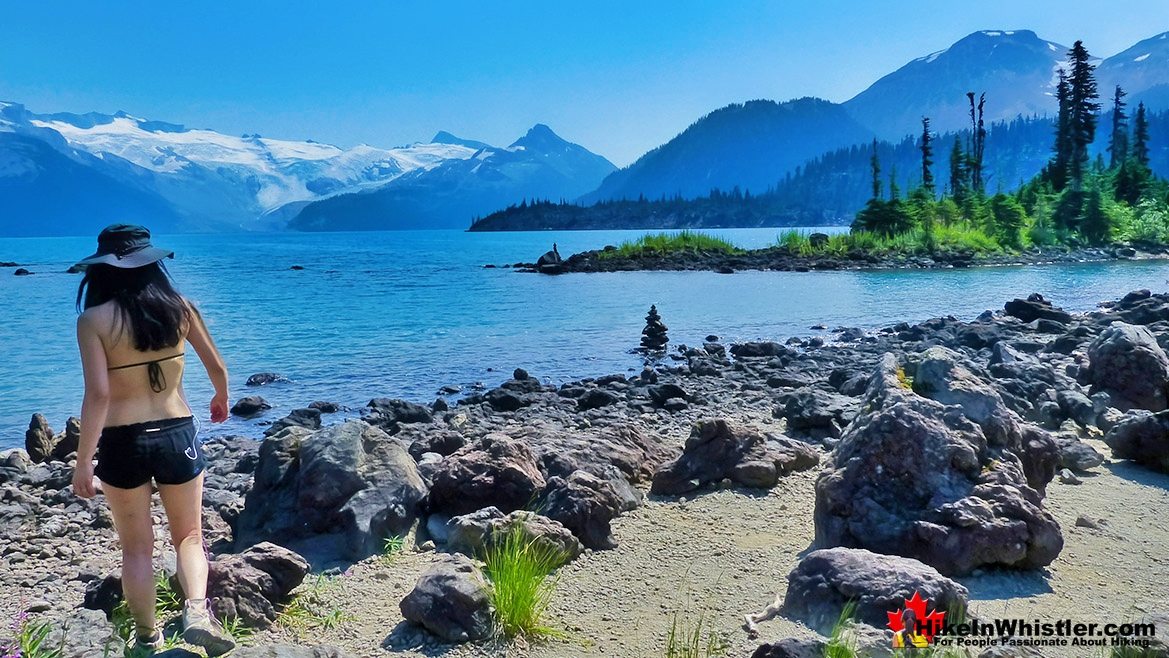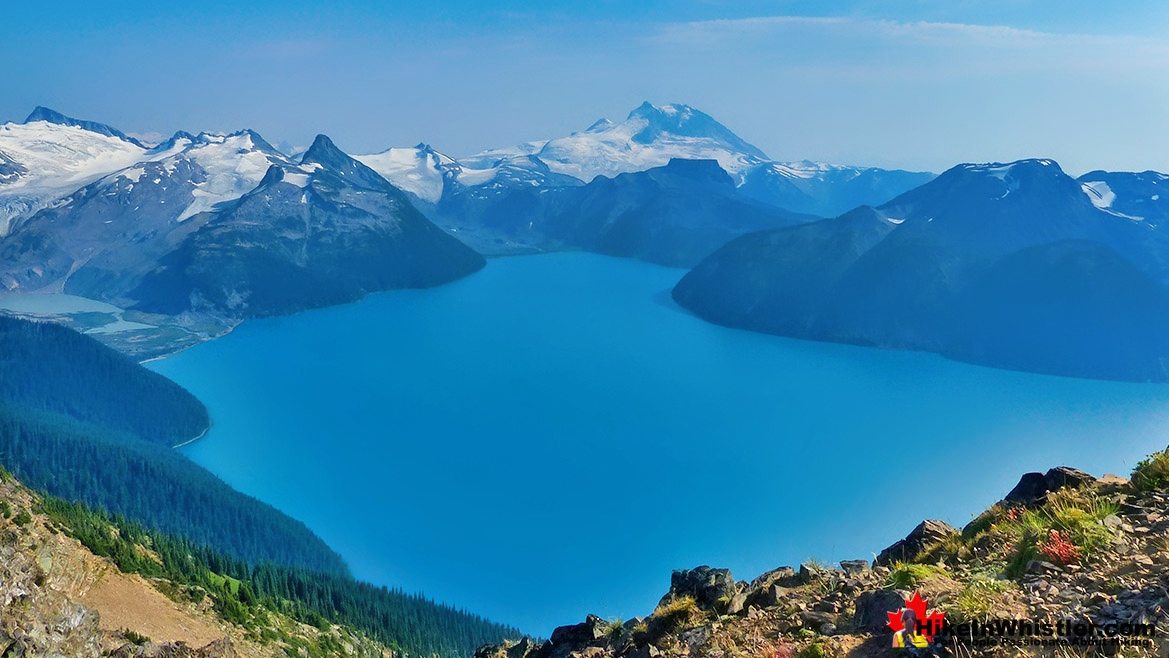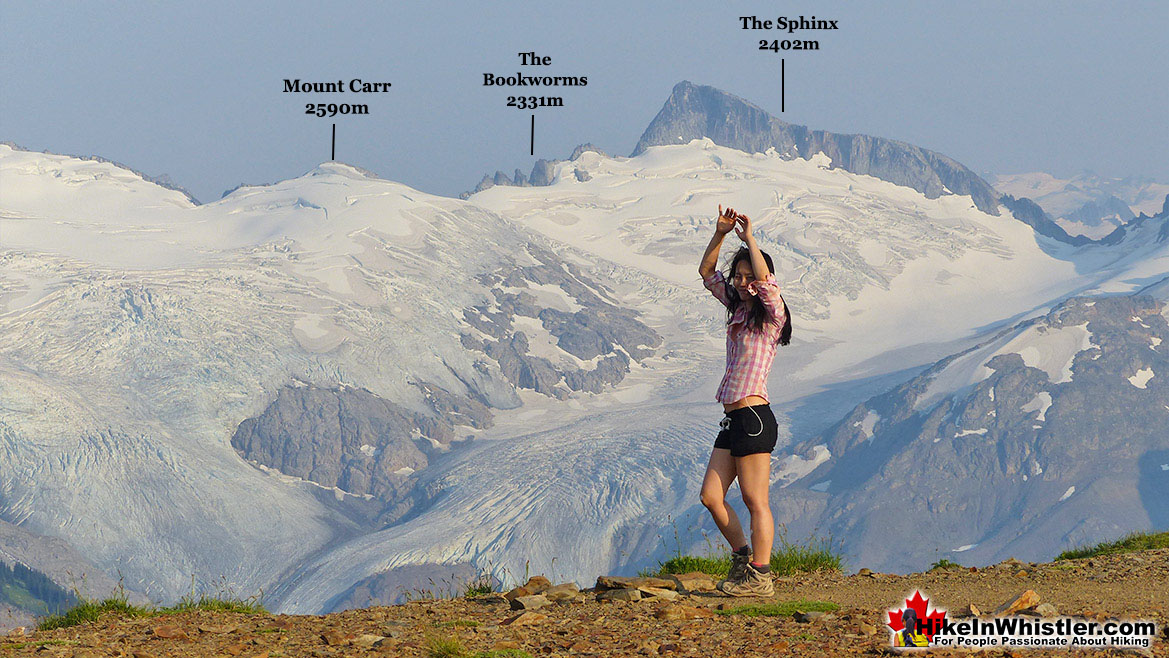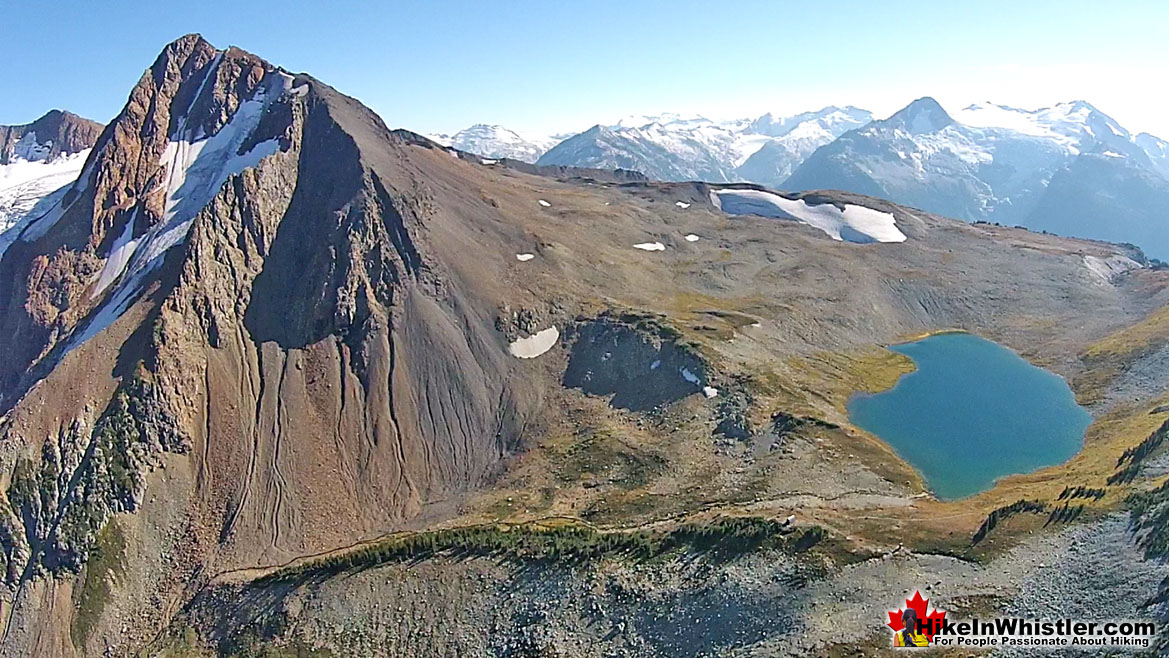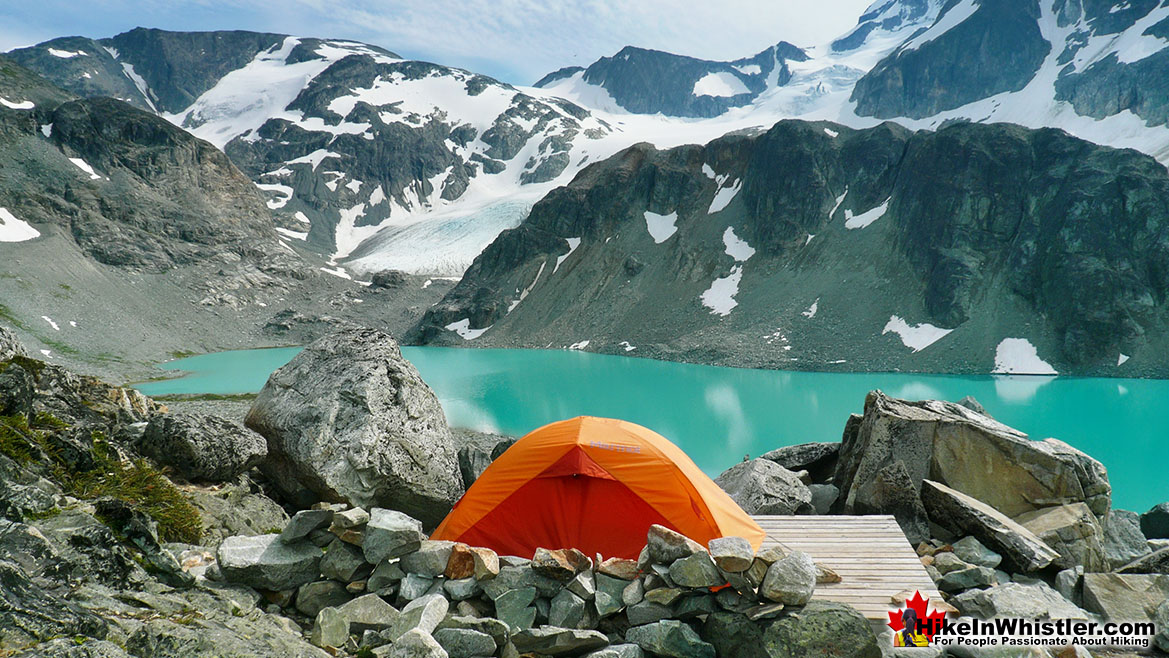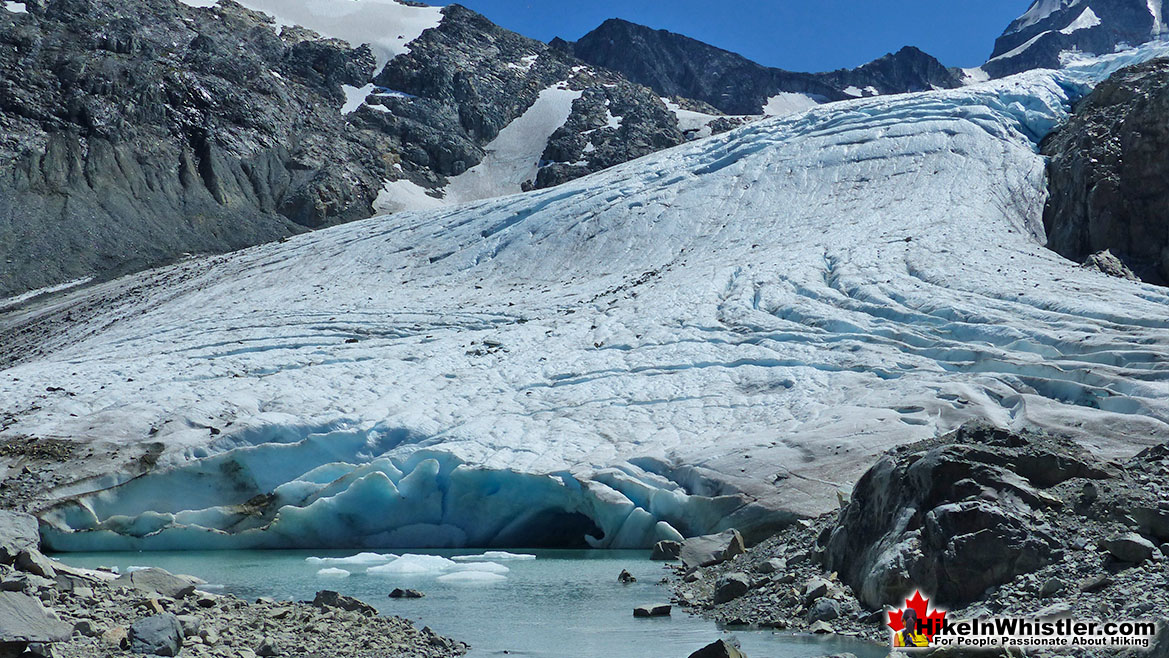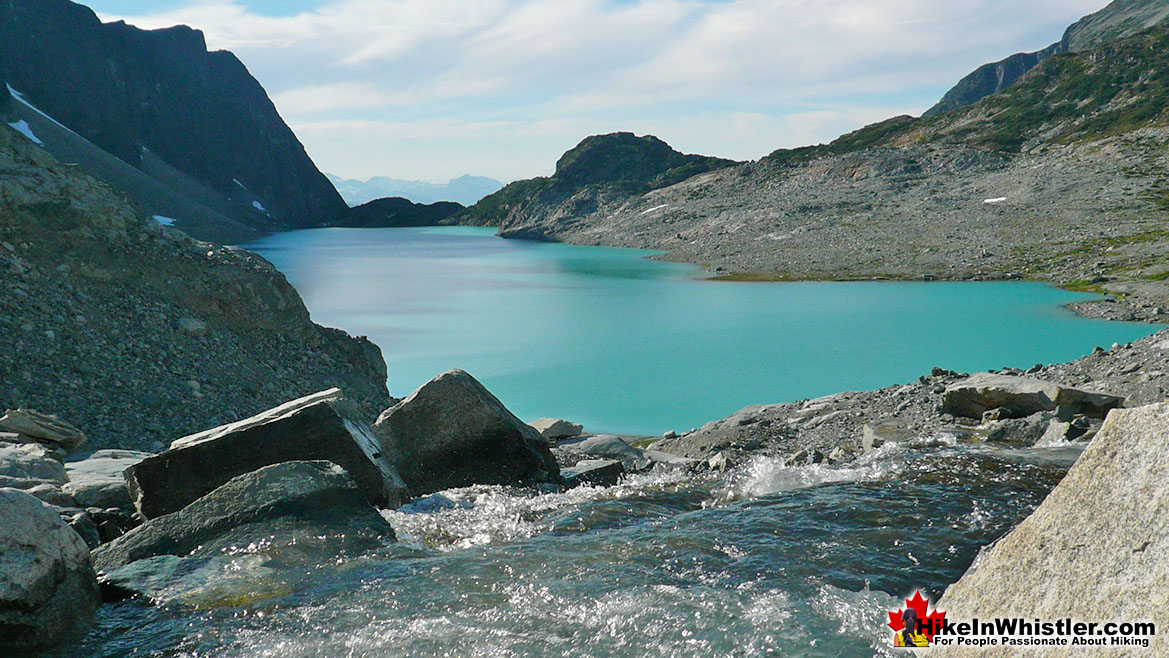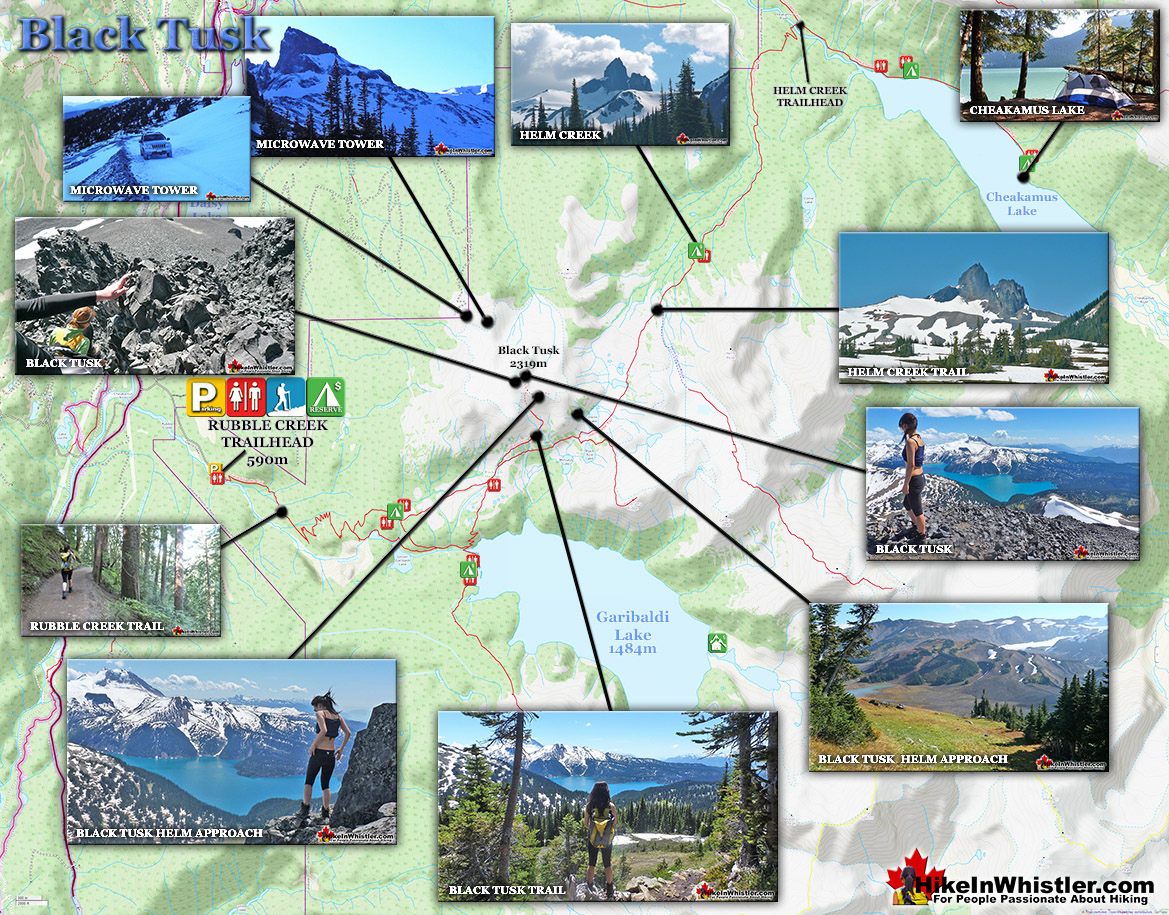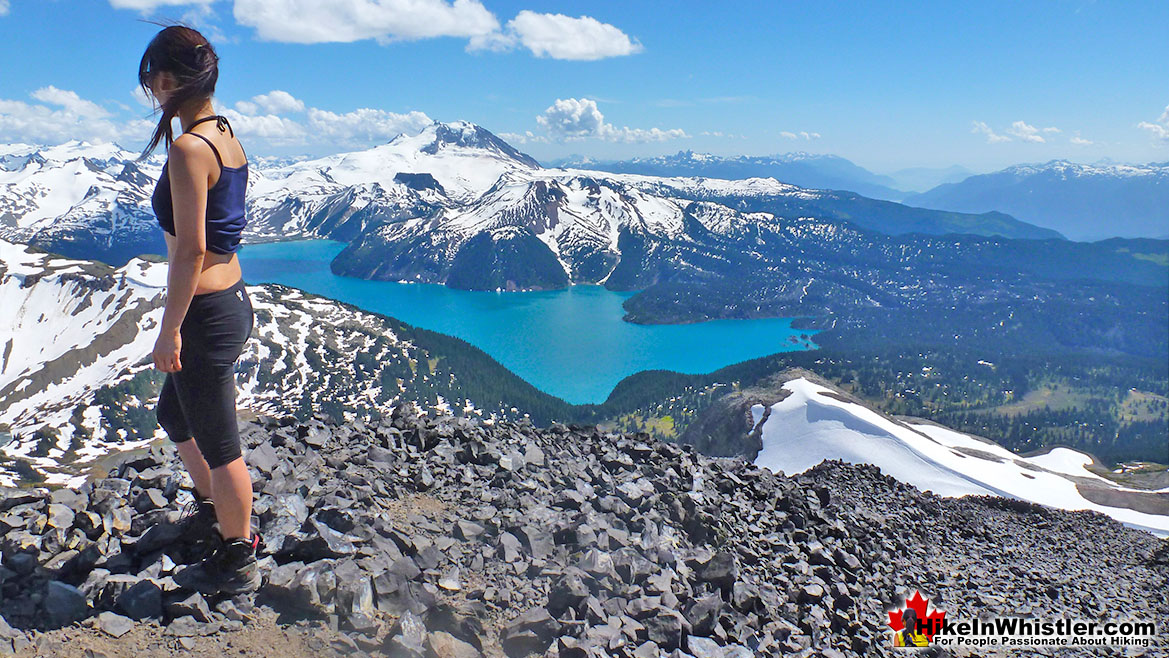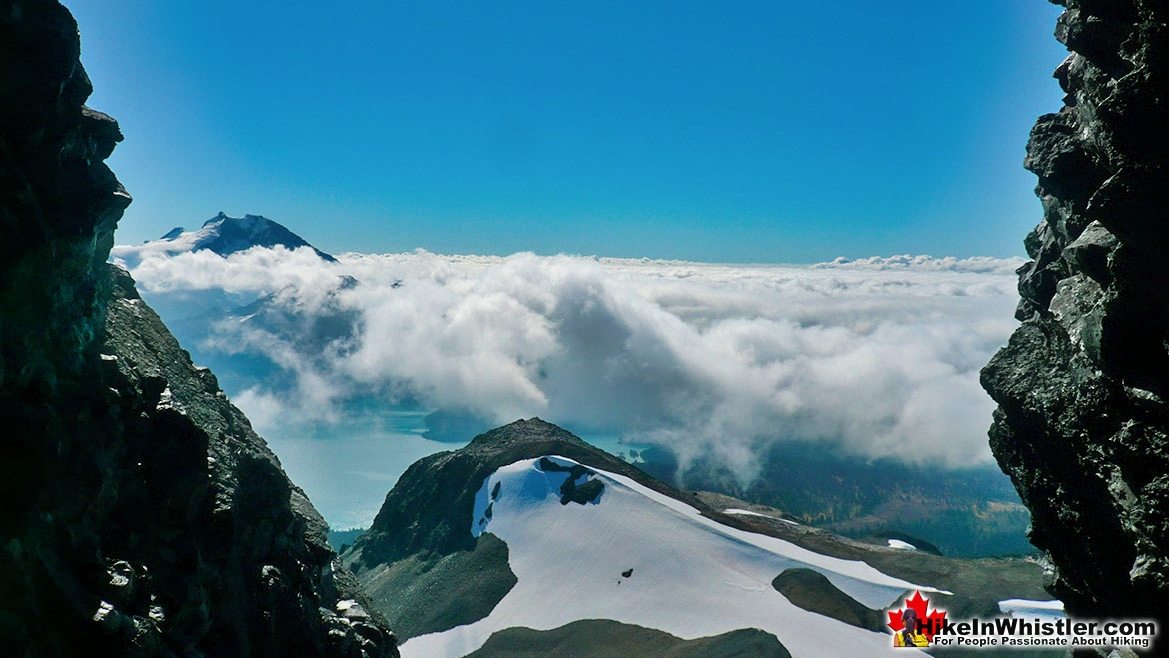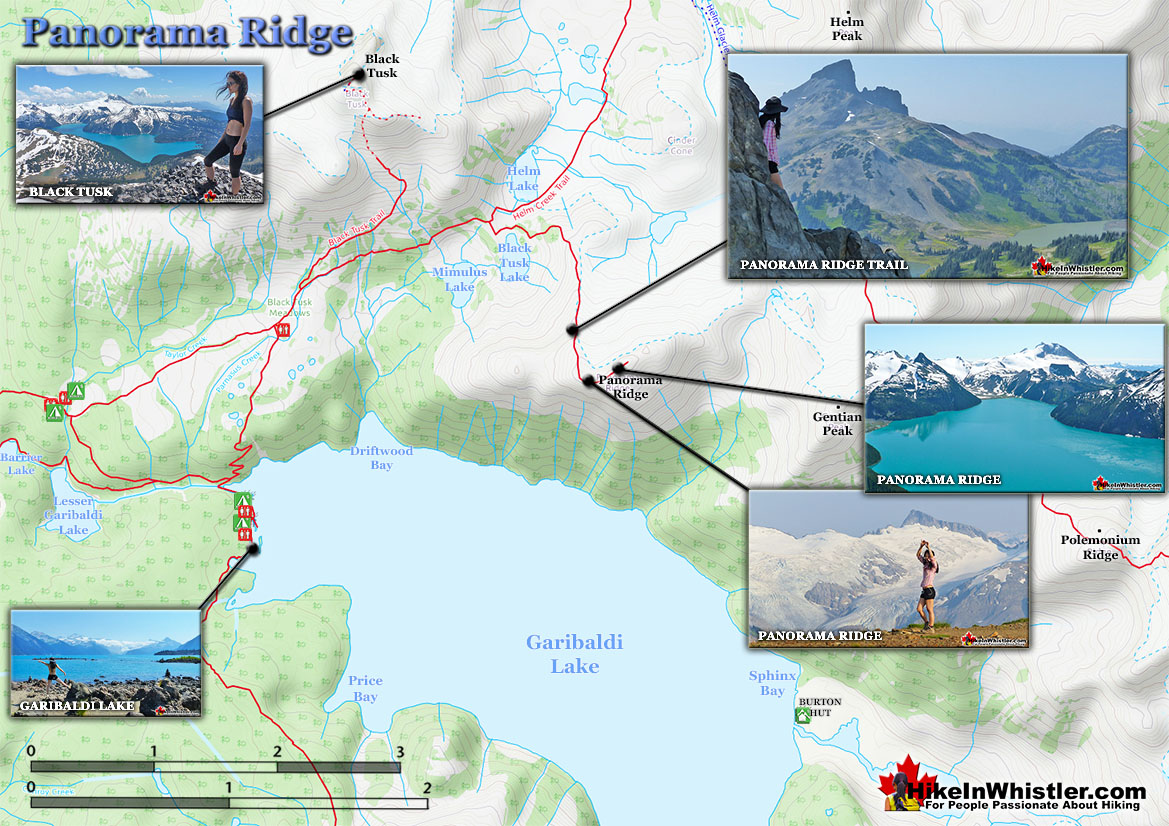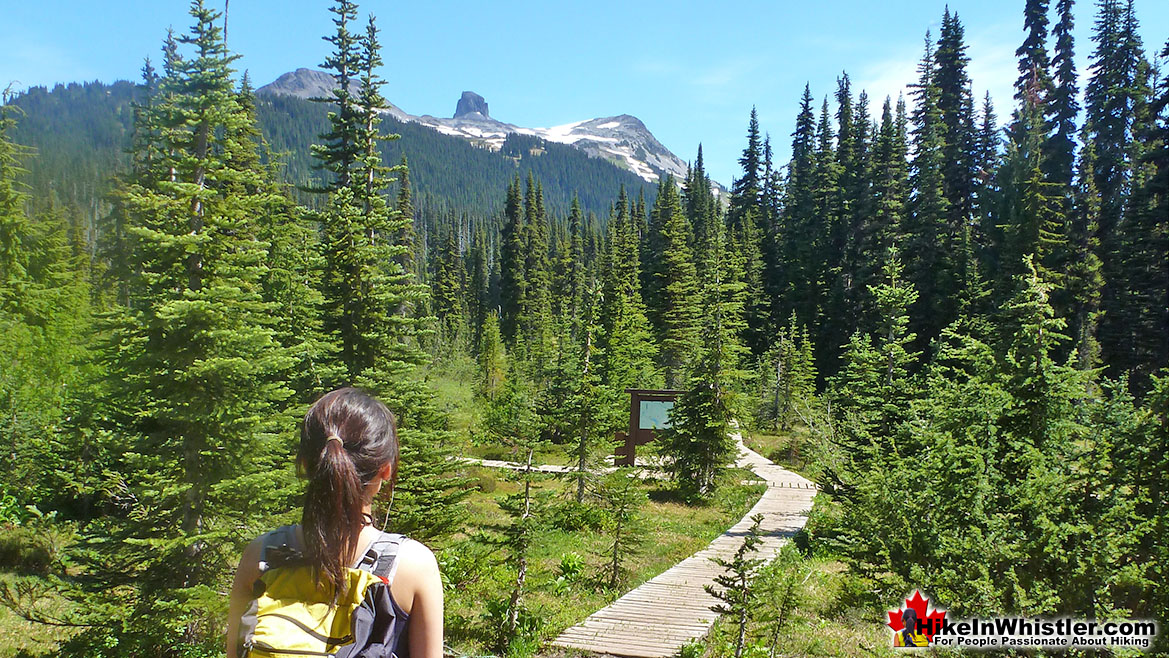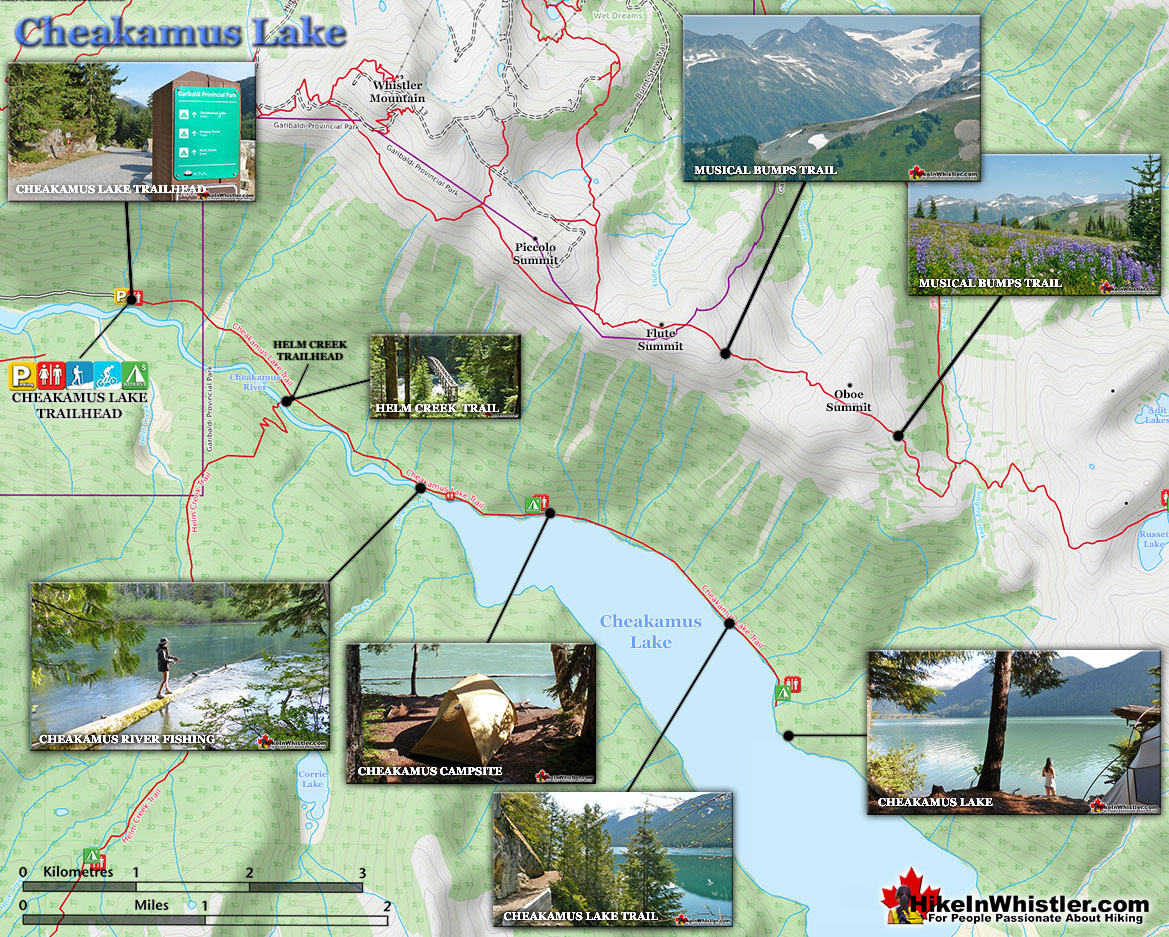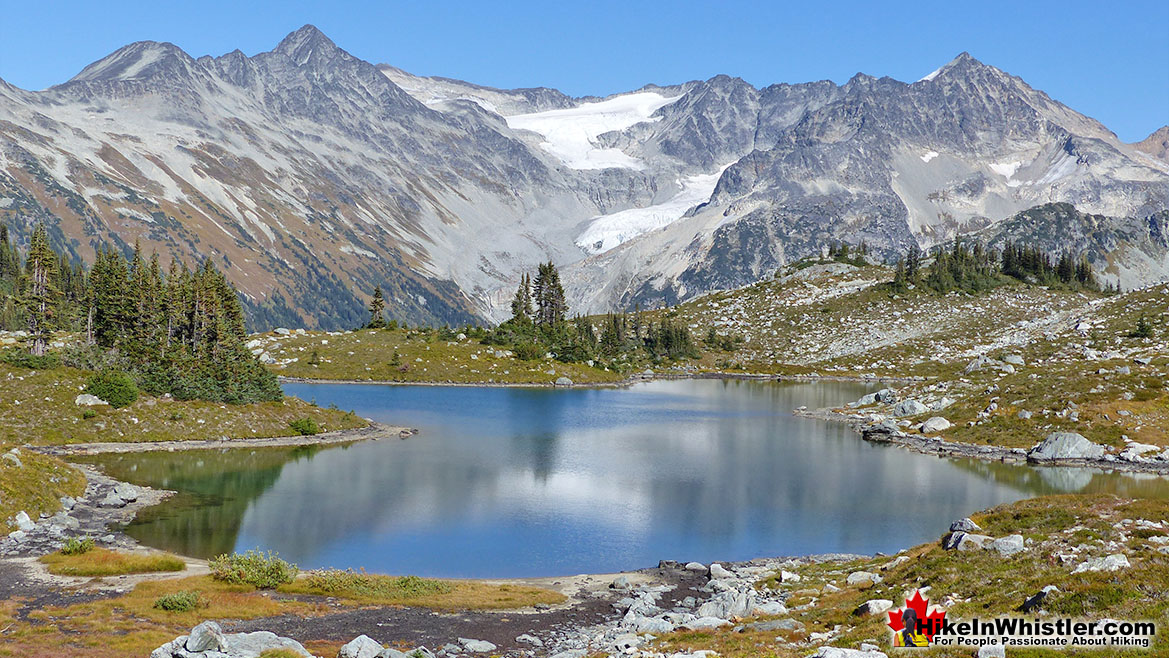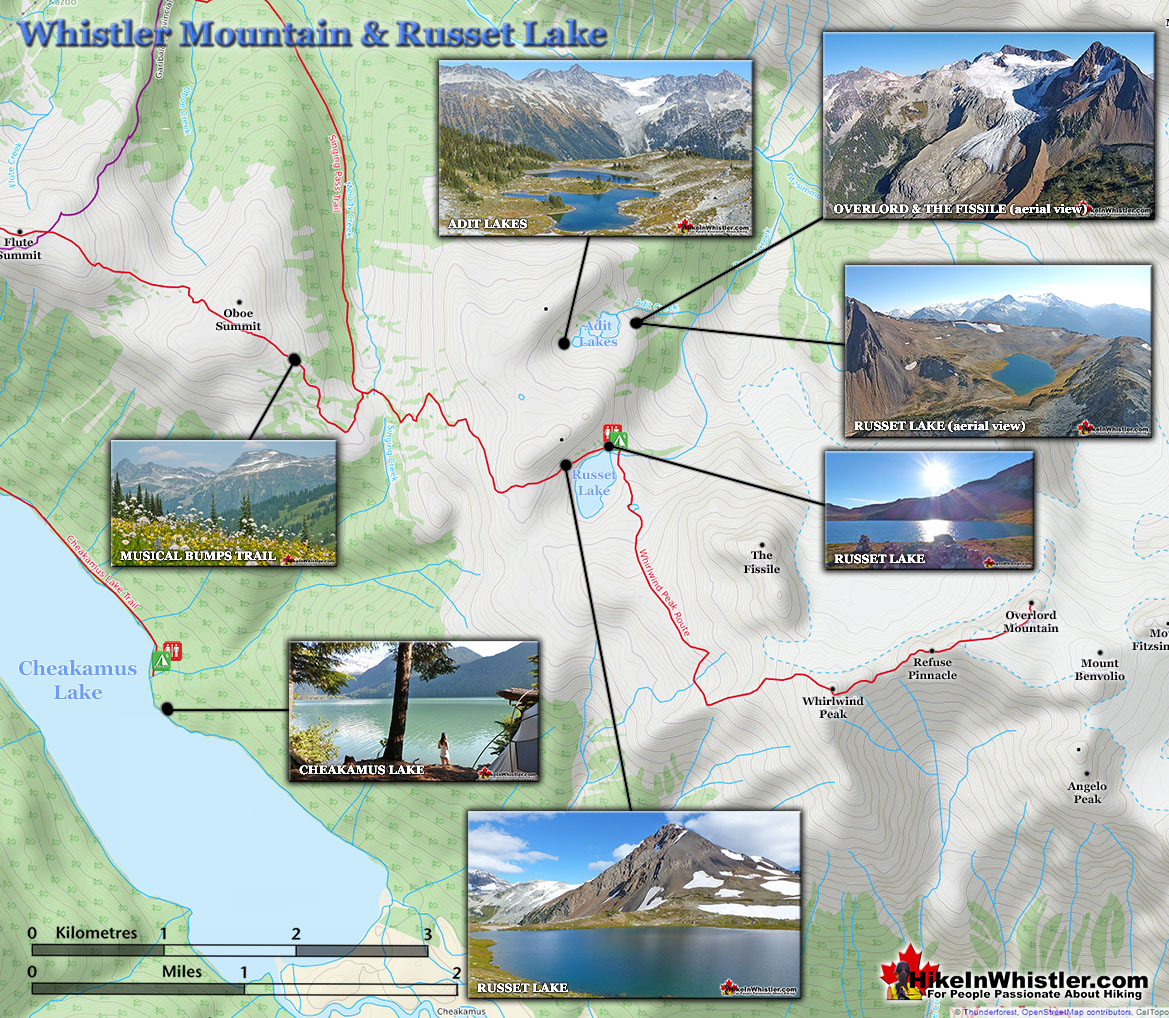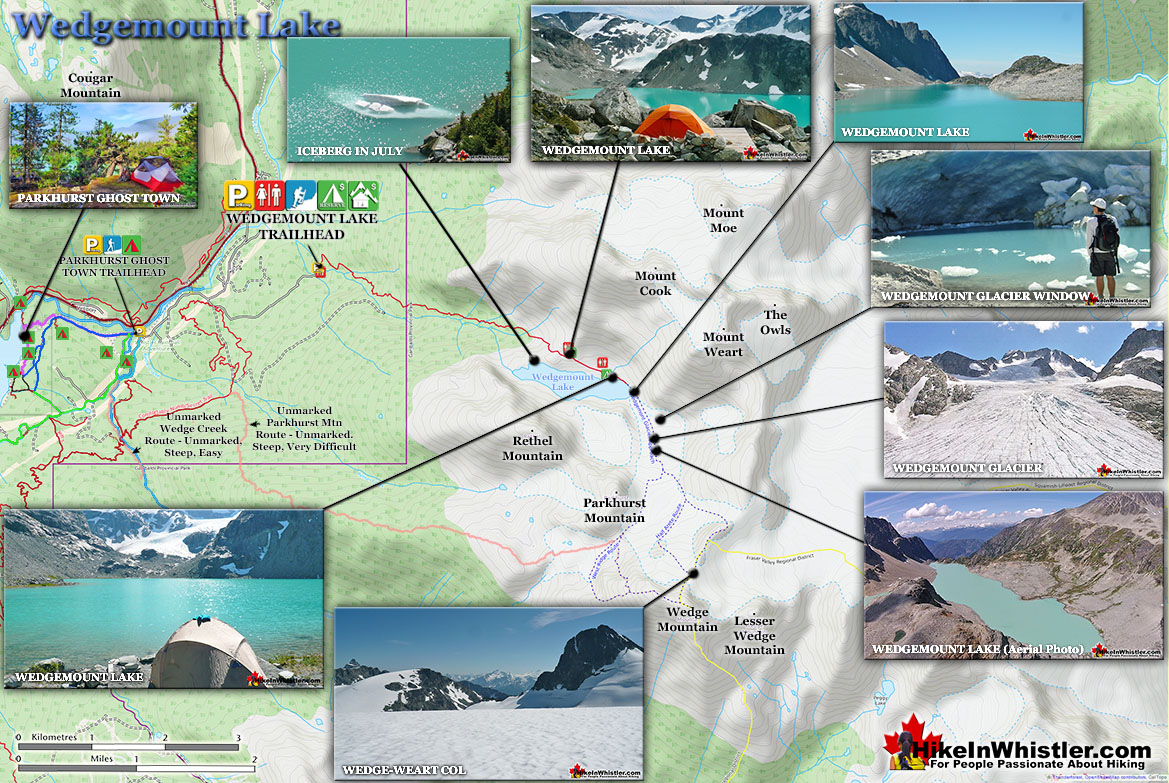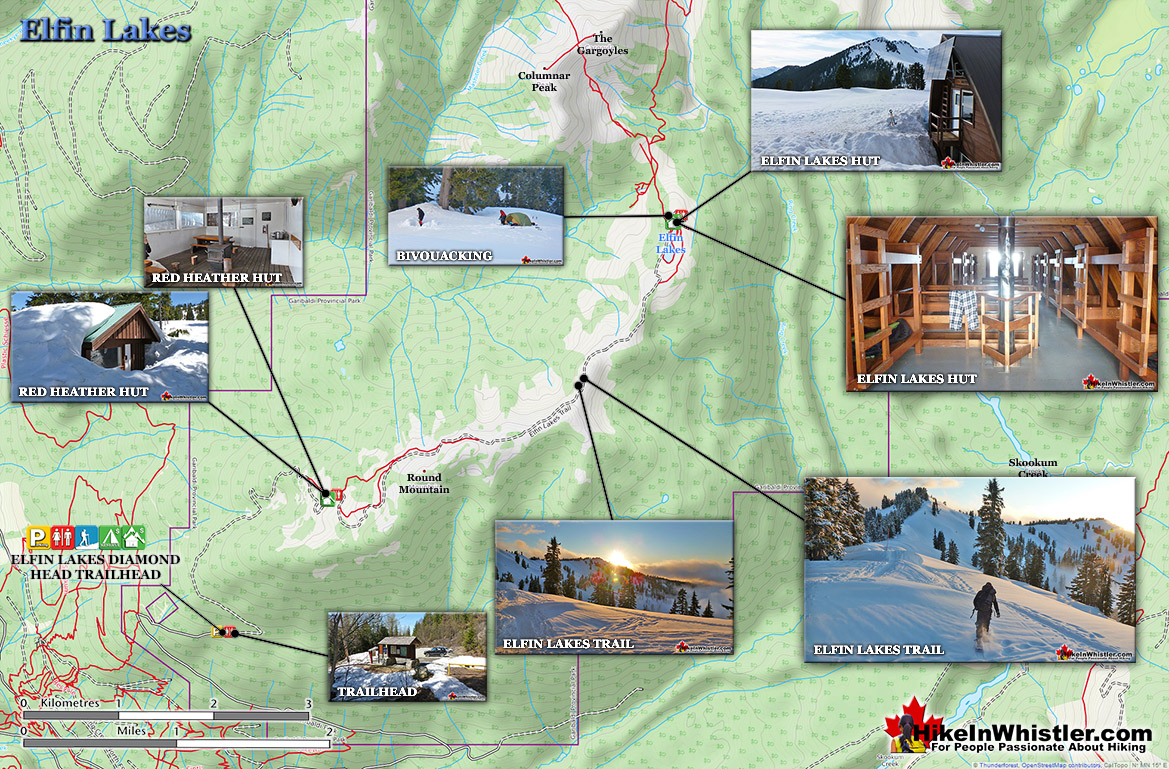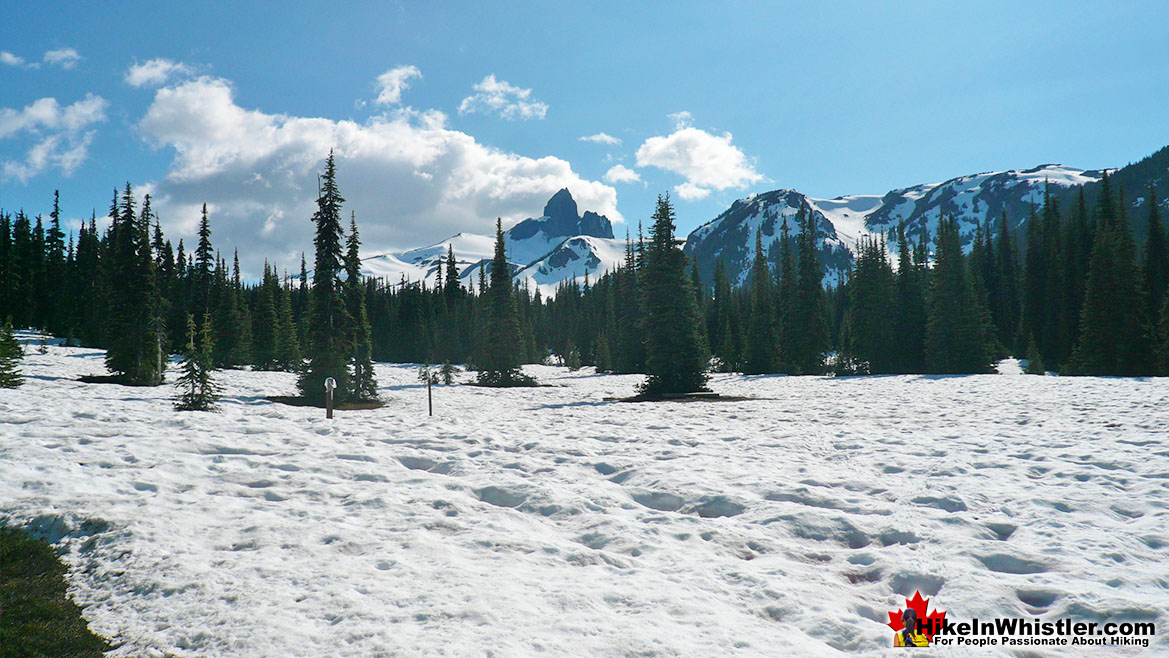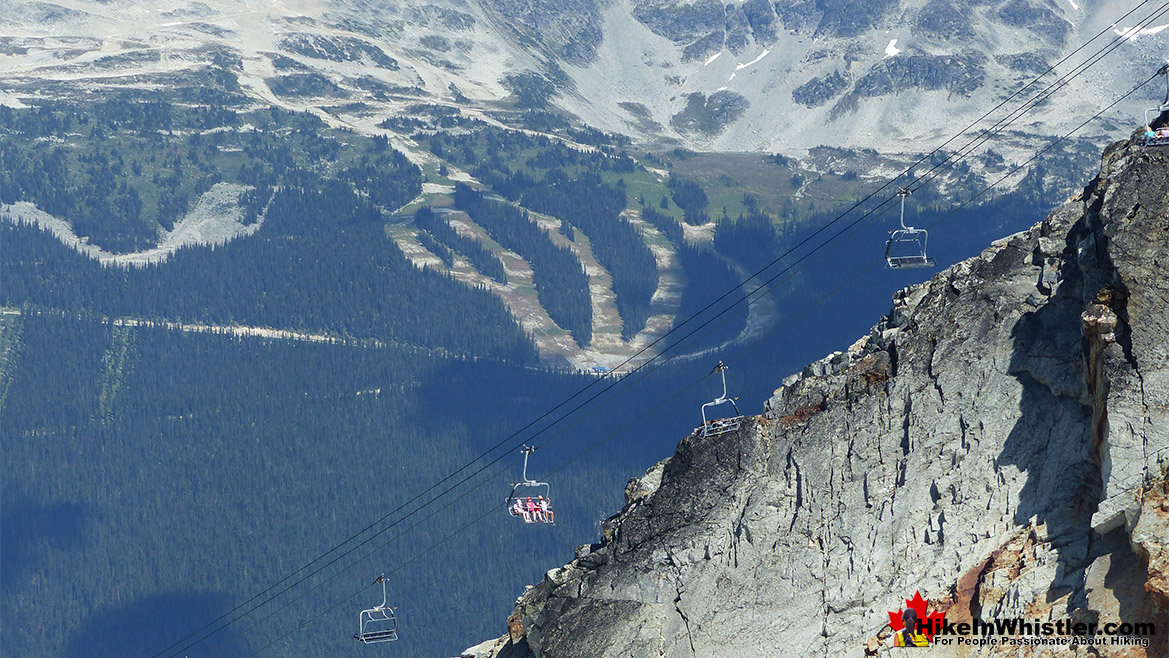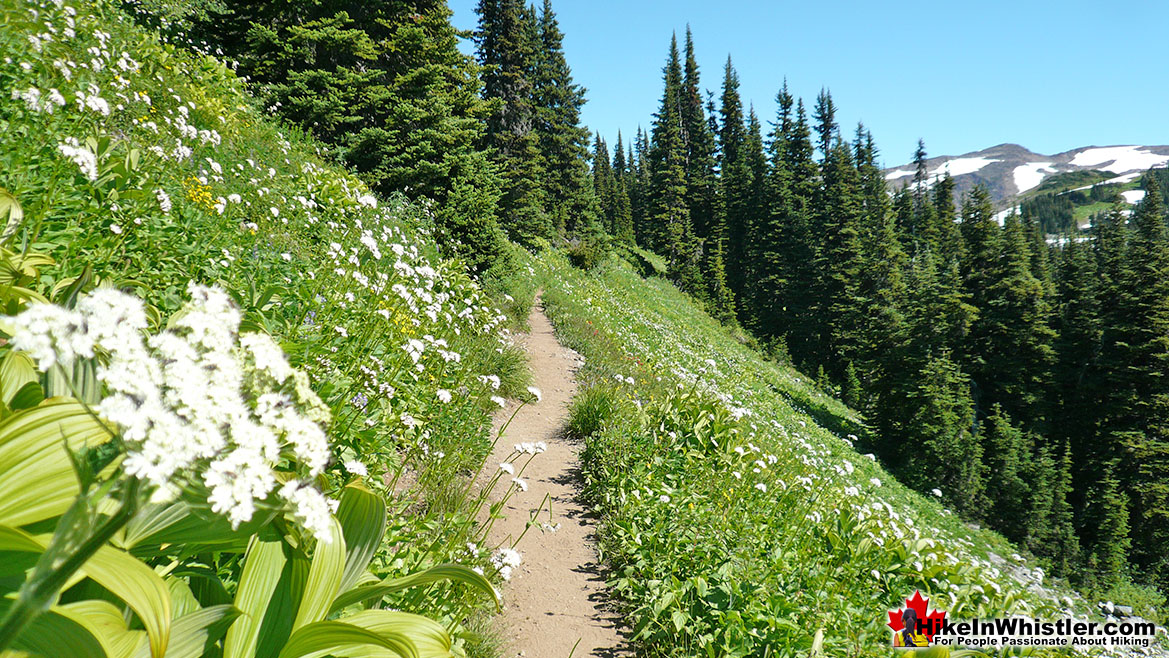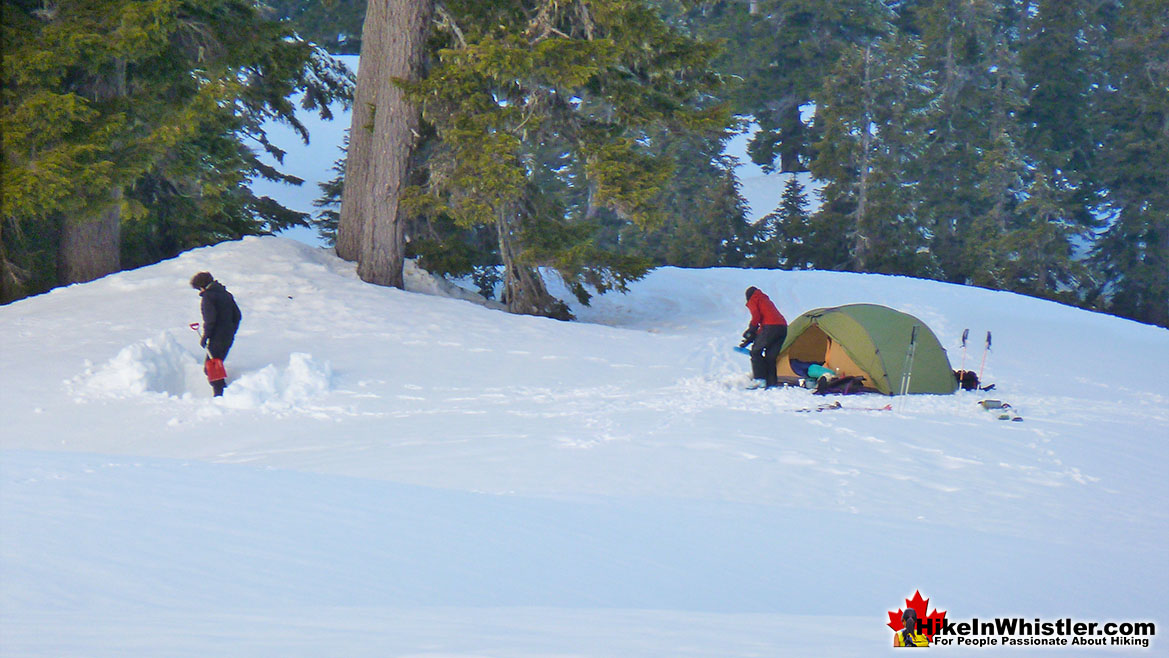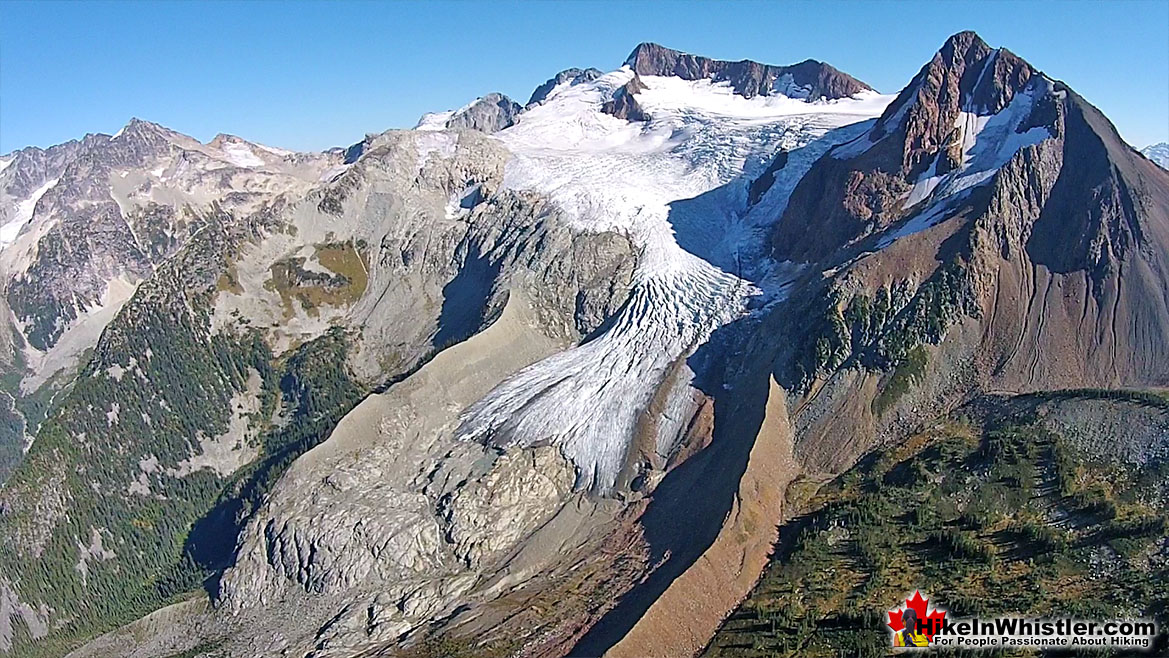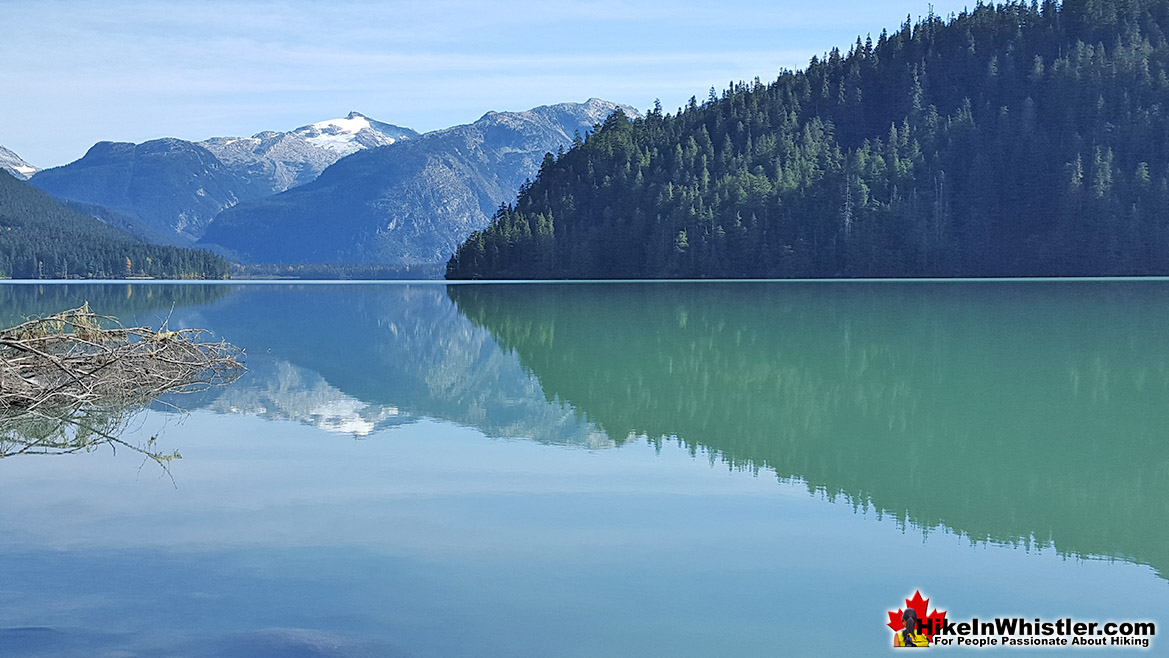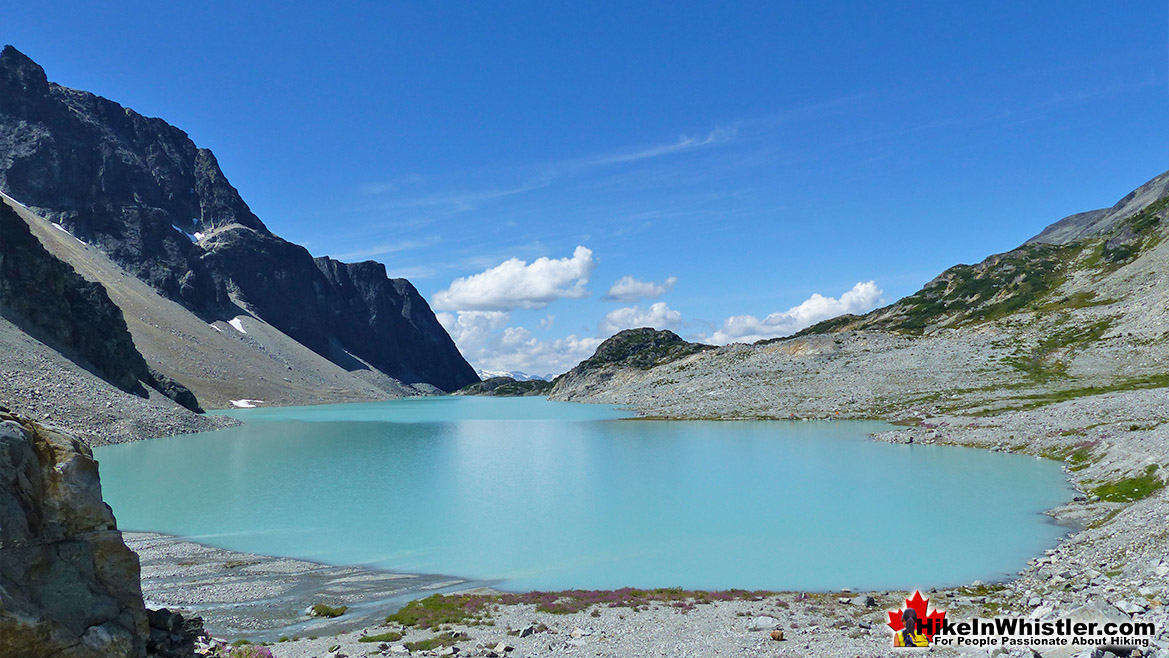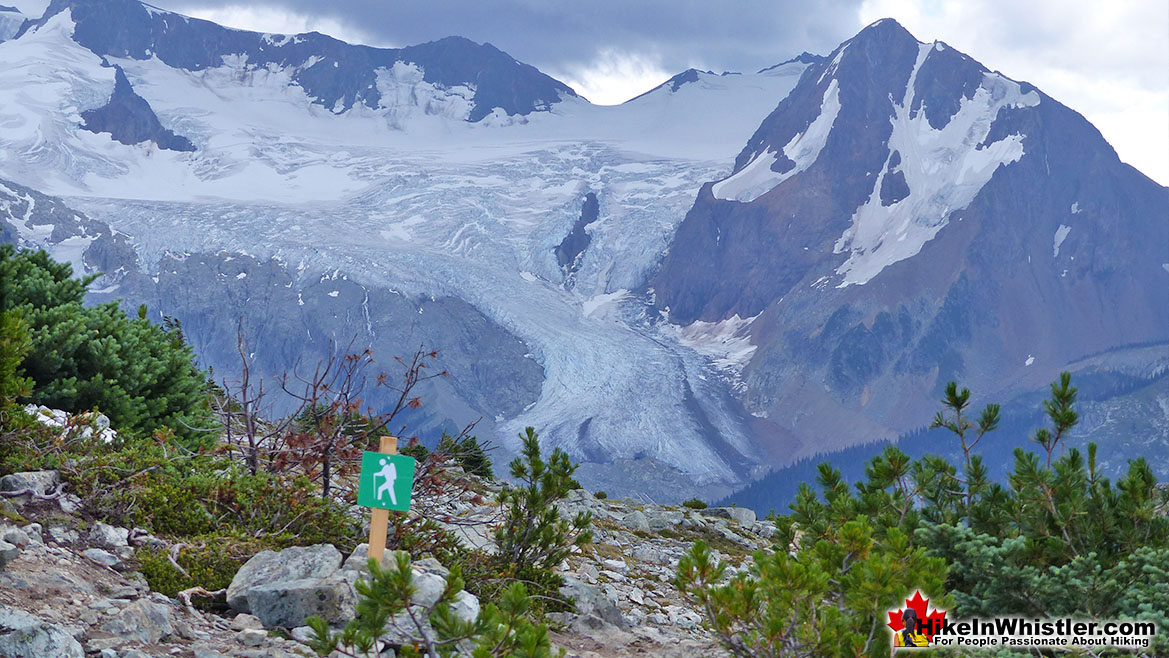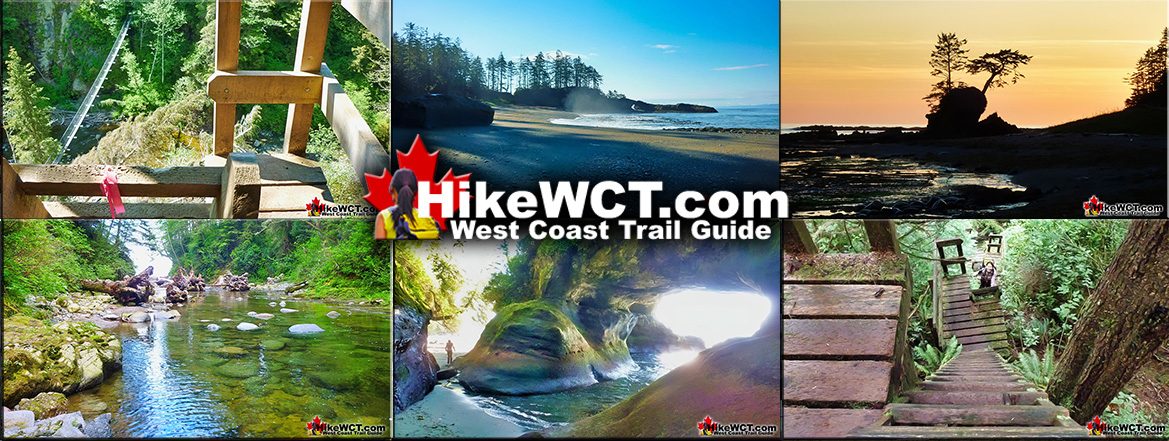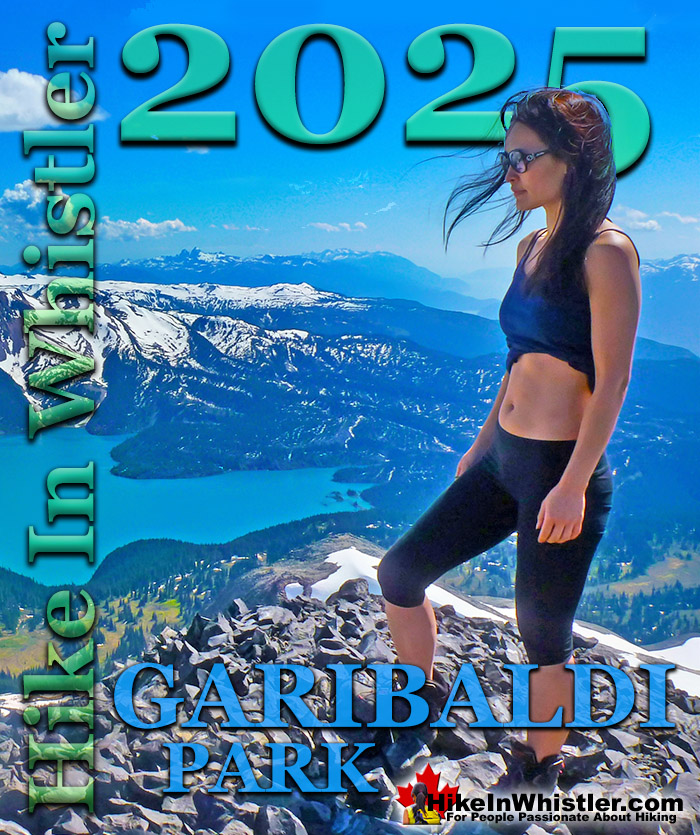
![]() Garibaldi Provincial Park is an enormous mountain wilderness park stretching from Pemberton to Squamish in British Columbia. At nearly 2,000 square kilometres, the park partly surrounds Whistler and is accessible by foot or by gondola from Whistler Village. Garibaldi Provincial Park is characterized by dense British Columbia coastal rainforest, snow-capped mountains, glaciers, and countless mountain lakes. The park boasts a tremendous variety of impressive hiking trails to glacier-fed turquoise lakes, surreal mountain summits, remote alpine huts, glaciers, flower-filled valleys, and a mostly untouched wilderness stretching beyond the horizon.
Garibaldi Provincial Park is an enormous mountain wilderness park stretching from Pemberton to Squamish in British Columbia. At nearly 2,000 square kilometres, the park partly surrounds Whistler and is accessible by foot or by gondola from Whistler Village. Garibaldi Provincial Park is characterized by dense British Columbia coastal rainforest, snow-capped mountains, glaciers, and countless mountain lakes. The park boasts a tremendous variety of impressive hiking trails to glacier-fed turquoise lakes, surreal mountain summits, remote alpine huts, glaciers, flower-filled valleys, and a mostly untouched wilderness stretching beyond the horizon.
Whistler & Garibaldi Hiking
![]() Alexander Falls
Alexander Falls ![]() Ancient Cedars
Ancient Cedars ![]() Black Tusk
Black Tusk ![]() Blackcomb Mountain
Blackcomb Mountain ![]() Brandywine Falls
Brandywine Falls ![]() Brandywine Meadows
Brandywine Meadows ![]() Brew Lake
Brew Lake ![]() Callaghan Lake
Callaghan Lake ![]() Cheakamus Lake
Cheakamus Lake ![]() Cheakamus River
Cheakamus River ![]() Cirque Lake
Cirque Lake ![]() Flank Trail
Flank Trail ![]() Garibaldi Lake
Garibaldi Lake ![]() Garibaldi Park
Garibaldi Park ![]() Helm Creek
Helm Creek ![]() Jane Lakes
Jane Lakes ![]() Joffre Lakes
Joffre Lakes ![]() Keyhole Hot Springs
Keyhole Hot Springs ![]() Logger’s Lake
Logger’s Lake ![]() Madeley Lake
Madeley Lake ![]() Meager Hot Springs
Meager Hot Springs ![]() Nairn Falls
Nairn Falls ![]() Newt Lake
Newt Lake ![]() Panorama Ridge
Panorama Ridge ![]() Parkhurst Ghost Town
Parkhurst Ghost Town ![]() Rainbow Falls
Rainbow Falls ![]() Rainbow Lake
Rainbow Lake ![]() Ring Lake
Ring Lake ![]() Russet Lake
Russet Lake ![]() Sea to Sky Trail
Sea to Sky Trail ![]() Skookumchuck Hot Springs
Skookumchuck Hot Springs ![]() Sloquet Hot Springs
Sloquet Hot Springs ![]() Sproatt East
Sproatt East ![]() Sproatt West
Sproatt West ![]() Taylor Meadows
Taylor Meadows ![]() Train Wreck
Train Wreck ![]() Wedgemount Lake
Wedgemount Lake ![]() Whistler Mountain
Whistler Mountain
![]() January
January ![]() February
February ![]() March
March ![]() April
April ![]() May
May ![]() June
June ![]() July
July ![]() August
August ![]() September
September ![]() October
October ![]() November
November ![]() December
December
Whether you're standing in Squamish or high up on Panorama Ridge, Mount Garibaldi towers in the distance. From a stunning vantage point like Brandywine Meadows, high in the mountains across the valley, Mount Garibaldi appears monstrously huge. It’s easy to imagine it bursting to life as an active volcano, which it technically still is. Named after 19th-century patriot and soldier Giuseppe Garibaldi, Mount Garibaldi is a massive 2,678-metre giant at the southern end of the park. It was named by Captain George Henry Richards of the Royal Navy in 1860, when Giuseppe Garibaldi gained worldwide acclaim for unifying Italy by repatriating Sicily and Naples. In 1907, a group of Vancouver climbers reached the summit of Mount Garibaldi, inspiring the development of Garibaldi Lake as a climbing and hiking base. In 1920, the Garibaldi Park Reserve was established, and in 1927, it became Garibaldi Provincial Park. Highlights of Garibaldi Park include the breathtaking views from Panorama Ridge, hiking to the top of Black Tusk, the stunning Garibaldi Lake, The Table—a bizarre, flat-topped mountain—and Wedgemount Lake’s incredible turquoise colour and easily accessible glacier. These are just a few of the popular highlights, but the list goes on and on.
Black Tusk from Whistler Mountain
Garibaldi Park from the Top of Black Tusk
Mountains Around Garibaldi Lake
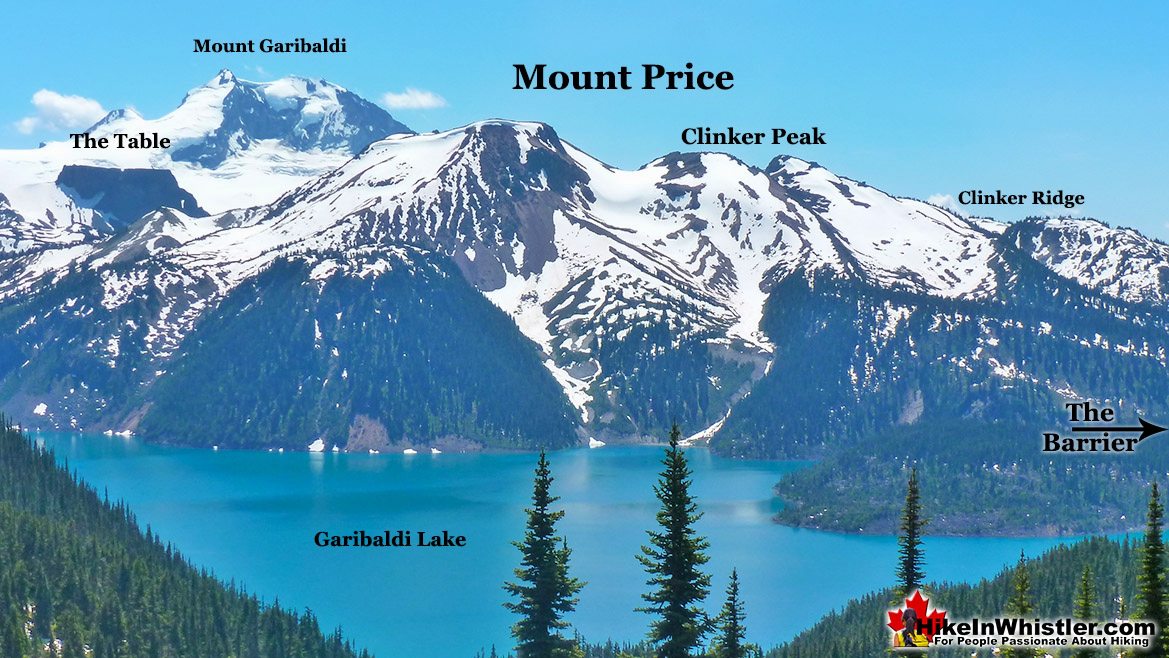
Garibaldi Lake Battleship Islands
Panorama Ridge Overlooking Garibaldi Lake
Panorama Ridge View of Sphinx Glacier
The Fissile and Russet Lake in Garibaldi Park
Wedgemount Lake Tent View
Wedgemount Glacier
Wedgemount Glacier View of Wedgemount Lake
Trailheads for Garibaldi Provincial Park
![]() There are five official Garibaldi Provincial Park trailheads, all marked by signs along the Sea to Sky Highway running near the western border of the park: the Diamond Head/Elfin Lakes trailhead in Squamish, the Black Tusk/Garibaldi Lake trailhead at Rubble Creek, the Cheakamus Lake trailhead at the south end of Whistler, the Singing Pass trailhead in Whistler Village, and the Wedgemount Lake trailhead at the north end of Whistler. The Black Tusk/Garibaldi Lake trailhead at Rubble Creek is the main access point for Garibaldi Lake, Taylor Meadows, Black Tusk, and Panorama Ridge. Its proximity to Vancouver and the variety of impressive destinations make the Garibaldi Lake, Rubble Creek trailhead the most popular in Garibaldi Provincial Park. Beyond Panorama Ridge, you can continue hiking down to Helm Creek and further to Cheakamus River, Cheakamus Lake, and the Cheakamus Lake trailhead.
There are five official Garibaldi Provincial Park trailheads, all marked by signs along the Sea to Sky Highway running near the western border of the park: the Diamond Head/Elfin Lakes trailhead in Squamish, the Black Tusk/Garibaldi Lake trailhead at Rubble Creek, the Cheakamus Lake trailhead at the south end of Whistler, the Singing Pass trailhead in Whistler Village, and the Wedgemount Lake trailhead at the north end of Whistler. The Black Tusk/Garibaldi Lake trailhead at Rubble Creek is the main access point for Garibaldi Lake, Taylor Meadows, Black Tusk, and Panorama Ridge. Its proximity to Vancouver and the variety of impressive destinations make the Garibaldi Lake, Rubble Creek trailhead the most popular in Garibaldi Provincial Park. Beyond Panorama Ridge, you can continue hiking down to Helm Creek and further to Cheakamus River, Cheakamus Lake, and the Cheakamus Lake trailhead.
Black Tusk/Garibaldi Trailhead
The Black Tusk/Garibaldi Lake trailhead at Rubble Creek is located off of the Sea to Sky Highway, partway between Squamish and Whistler. About 25 minutes driving time south from Whistler Village or 25 minutes north from downtown Squamish. From this trailhead, Garibaldi Lake is 9 kilometres along a well used and moderately challenging, continuously ascending trail that some find exhausting. Taylor Meadows branches off from this trail partway to Garibaldi Lake. From Rubble Creek to Taylor Meadows is 7.5 kilometres. Both Taylor Meadows and Garibaldi Lake are pay-to-use campgrounds with outhouses, tent pads, picnic tables, day-use food storage huts and a park ranger often in the area. There are no garbage facilities in any Garibaldi Provincial Park campgrounds, so you will always need to pack out what you pack in. Nearly everywhere you hike in Garibaldi Park you will have plenty of fresh water sources and though you see frequent warnings to treat or filter water must hikers usually don’t. With the exception of the water sources at the Garibaldi Lake campsite and the Elfin Lakes campsite, where treating and filtering water is highly recommended. Getting a water borne illness from water in the park is very rare because of the sources of water are glacier fed streams. Still, even an extremely remote chance of getting giardia(beaver fever) is reason enough to make a practice of treating or filtering water. With modern, extremely inexpensive water treatment tablets, treating water takes just seconds.
Rubble Creek Trail Garibaldi Park
From the trailhead at Rubble Creek, the trail forks at 5.5 kilometres: left to Taylor Meadows and right to Garibaldi Lake. Continuing trails lead to Black Tusk (13.5 kilometres from Rubble Creek) and Panorama Ridge (15 kilometres). These are challenging destinations, and tackling both in a day hike is not realistic for most hikers. An overnight base camp at Taylor Meadows or Garibaldi Lake is a popular alternative. While a day hike tests endurance, camping allows you to savor the view from the summit of Black Tusk, the stunning panorama from Panorama Ridge, or the flower-filled valleys along the way. The Black Tusk area of Garibaldi Park is marvelous for its geological features, with Black Tusk itself being a standout marvel.
Black Tusk in Garibaldi Park
Black Tusk is the descriptively named stark black mountain that can be seen from almost everywhere in Whistler. The massive black spire of crumbling rock juts out of the earth in an incredibly distinct way that appears like an enormous Black Tusk plunging out of the earth. Whether you spot it kilometres away, from the top of Whistler Mountain or from dozens of vantage points along the Sea to Sky Highway, its unmistakable appearance is stunning. Seeing Black Tusk from closer vantage points such as Taylor Meadows, Helm Creek, Panorama Ridge or Garibaldi Lake, all views make climbing to the top look impossible. In fact, Black Tusk seems to look more impossible to climb the closer you get to it. Even when you are close enough to touch its vertical, black and crumbling sides, you wonder in amazement how anyone can ever reach the top.
Black Tusk Chimney View of Mount Garibaldi Above the Clouds
Panorama Ridge in Garibaldi Park
Panorama Ridge is easily one of the most amazing and rewarding hikes in Garibaldi Park. The 15 kilometre hike from the trailhead at Rubble Creek to Panorama Ridge takes you through beautiful and deep forests, across countless idyllic streams, through meadows filled with flowers, and past dozens of jaw dropping viewpoints. The amazing views start once you reach Taylor Meadows and get even more spectacular as the trail continues. Once you arrive at Panorama Ridge and its phenomenal vantage point, high above Garibaldi Park, you will stare in wonder. Mesmerized first by Garibaldi Lake, far below you and looking unnaturally blue, the lake looks amazing surrounded by green, untouched wilderness and snow capped mountains. Taylor Meadows is a beautiful campsite and alternative to the much busier Garibaldi Lake campsite. Located in between Garibaldi Lake and Black Tusk itself. It is reached from the same trailhead to Garibaldi Lake. There are 40 very nice tent platforms, toilets, a good water source and a food cache, all in the lush forest of Taylor Meadows with the distant view of Black Tusk.
Taylor Meadows and Garibaldi Lake Campgrounds
Taylor Meadows is 7.5 kilometres from Rubble Creek through a deep, big and beautiful forest. The first 5.5 kilometres is a series of switchbacks through the forest before finally opening up to Taylor Meadows. The grassy meadows give you wide open views of snowy mountains and the spectacular Black Tusk just a couple kilometres away. Garibaldi Lake is the centre and base for much of the hiking in Garibaldi Park. The Garibaldi Lake campsite is located on the amazing, turquoise shores of this massive and mostly undisturbed mountain lake. There are no trails around the perimeter of the lake with the exception of the small section leading to the campsite, so your view of the lake is a sea of unnaturally coloured water ringed by swaths of forest and a magnificent glacier towering in the distance. The water is painfully cold, though plenty of brave hikers swim here as well as camp. The camping area is well laid out and stretches deep into the forest with 50 tent clearings. You can, except for the busiest of days, put your tent out of earshot and sight of others. The trail to Garibaldi Lake from the Rubble Creek trailhead, just off of the Sea to Sky Highway takes about 2.5 hours at a fast pace and 3.5 hours at a slower pace. You gain a fair amount of elevation, 900 metres in just 9 kilometres, trailhead to lake. Partway along the trail to Garibaldi Lake the trail forks. Right to Garibaldi Lake and left goes to Taylor Meadows. Past Taylor Meadows you can link back to Garibaldi Lake by yet another connecting trail. At every trail for there are nice and clear signs and sometimes maps, showing where and how far everything is.
Taylor Meadows View of Black Tusk
Cheakamus Lake Trailhead to Garibaldi Park
The Cheakamus Lake trailhead to Garibaldi Provincial Park is located at the southern end of Whistler near Cheakamus Crossing. From the highway you drive 8 kilometres up a very potholed forest service road. From this trailhead you can hike to Cheakamus Lake with its two small, but beautiful campsites or take the connecting trail partway to the campground at Helm Creek. From Helm Creek you can hike to Panorama Ridge and Black Tusk. The trail continues to the Rubble Creek trailhead via Taylor Meadows or Garibaldi Lake. Both are equally scenic routes to take, however Garibaldi Lake is a bit longer due to the short detour down to the lake. It does have the wonderful bonus of an opportunity to swim in a spectacular alpine lake with a glacier pouring into the far end! Bikes are allowed on the Cheakamus Lake trail and biking to the lake is fairly easy. A short, steep section at the start of the trail, then gradual up and down hills to the lake with not a lot of overall elevation gain. You gain almost all of the elevation gain to the lake on the drive up the logging road to the trailhead parking lot.
If you are driving from Whistler Village, the Cheakamus Lake trailhead is about halfway the distance to the Rubble Creek trailhead. Rubble Creek is just 2 kilometres from the Sea to Sky Highway turnoff and the Cheakamus Lake trailhead is 8.5 kilometres from the highway. So in terms of driving time, Rubble Creek is a bit faster to get to as you are driving at 100 kilometres per hour most of the way. On the rough and potholed Cheakamus Lake forest service road, even an SUV tends to crawl along at less than 40 kilometres per hour due to the deep potholes and occasional deeper waterbar. If you have driven to Callaghan Lake you will find the drive to the Cheakamus Lake trailhead much smoother, however both require slow and careful driving. All sorts of regular cars make it to both parking lots, but at a much more careful pace than SUV type vehicles.
Singing Pass Trailhead to Garibaldi Park
The Singing Pass trailhead to Garibaldi Provincial Park is hidden in Whistler Village in the midst of all the action. To find it you have to spot the very small trailhead sign a couple hundred metres up Whistler Mountain in the midst of downhill mountain bike trails in the summer and ski runs in the winter. If you start hiking from the bus stop next to the base of Whistler Mountain. There is a yellow vehicle gate and the Blackcomb Gondola will be passing overhead. You start hiking up the wide gravel road, keeping left for a couple hundred metres until you see the huge water tank on the left and the small Singing Pass trailhead sign and a well worn trail ascending into the forest. It is a long and continuous trek through the forest for a couple hours as you skirt the edge of Whistler Mountain in the deep valley separating Whistler Mountain and Blackcomb Mountain. From Whistler Village to Russet Lake is 14.5 kilometres and at a reasonable hiking pace should take about 4 hours to get there.
Adit Lakes Near Russet Lake in Garibaldi Park
Trails to Russet Lake in Garibaldi Park
The Singing Pass trail to Russet Lake and/or to the Musical Bumps trail to Whistler Mountain has been terribly neglected over the decades. One upon a time you could drive a few kilometres up Whistler Mountain to a trailhead parking lot, shaving off three kilometres of somewhat tedious, uphill hiking. When Whistler became a ski resort and the skiing infrastructure sprang up, the Singing Pass trail became an inconvenience and was allowed to disintegrate. One small area in particular along the trail has the original road gouged out and is now a loose boulder gorge about 25 metres across where scrambling through with a heavy pack is tricky. This section of missing road has ensured that the trailhead stays far away in Whistler Village. The neglected Singing Pass trail is a positive for Whistler Mountain. The preferred route to Russet Lake is via the Musical Bumps trail which is accessed via purchasing a lift pass and riding up Whistler Mountain. In an ideal world the Singing Pass trail would be repaired to its original design and then allowing for a much shorter and more enjoyable hike to the alpine. In the scheme of things, it is not terribly important to the park. Though some may find a Whistler lift pass expensive at $120 for a day or just a little more for an unlimited seasons pass, it is really quite a deal. The amount of hiking trails, attractions and carnival like chairlifts on the mountains is extraordinary and hiking to Russet Lake by starting at the summit of Whistler Mountain is infinitely more amazing than the Singing Pass ascent.
Wedgemount Lake Trailhead to Garibaldi Park
The Wedgemount Lake trailhead is located north of Whistler Village, beyond the north end of Green Lake. It is just a couple kilometres up a fairly decent logging road. Much shorter and smoother than the Cheakamus Lake logging road. The trail to Wedgemount Lake is much steeper than most other trails in Garibaldi Park. You gain a whopping 1220 metres(4003 feet) in just 7 kilometres. By comparison, Garibaldi Lake via Rubble Creek is just 900 metres(2953 feet) in 9 kilometres. Though the Wedgemount Lake trail is steep, it is comparatively short. It takes most hikers with a heavy pack about 3 hours to hike the trail, though a fit person with a very light pack can do it in 90 minutes. Because the trail to Wedgemount Lake is steep and the trailhead is the farthest from Vancouver, it is considerably quieter than the chaotic trailheads further south.
Diamond Head/Elfin Lakes Trailhead to Garibaldi Park
The Diamond Head/Elfin Lakes trailhead to Garibaldi Provincial Park is located in Squamish near the southern end of the park. Like the Cheakamus Lake trail, the Diamond Head/Elfin Lakes trail is bike friendly. Considerably steeper and longer than the trail to Cheakamus Lake, however. This trailhead is fairly popular year-round. The well laid out 11 kilometre route to Elfin Lakes is well marked in the winter and popular with skiers and snowshoers. The wonderful Elfin Lakes hut is a huge draw to this hike in the winter as it is heated and has solar power as well as room for 33 people! Anytime of the year the alpine around Elfin Lakes is stunning. You get amazingly dramatic mountain views in all directions and on a sunny day in the summer it is paradise. The trailhead parking lot is high above Squamish up a long, rapidly ascending road. So getting up there in the winter usually requires tire chains. You may not need them, but you must have them to get to the trailhead. You may get turned away if you don’t have chains with you. Or worse, you may get up to the parking lot without chains, then get snowed in and unable to drive out.
Hiking Season in Garibaldi Provincial Park
![]()
Located in the high alpine of the Coast Mountain Range, Garibaldi Provincial Park sees heavy snow accumulation, varying year to year. Snow can persist into June or early July, making spring hiking unpredictable. BC Parks’ trip reports, released every couple of weeks, provide snow depth updates. Webcams at Whistler Mountain’s Roundhouse Lodge offer a glimpse of snow levels at comparable elevations. Even in snowy winters, determined hikers can reach Garibaldi Lake, Taylor Meadows, Black Tusk, or Elfin Lakes by late June, though snowshoes and gaiters may be necessary. The Wedgemount Lake trail, due to its steepness, remains snowy into early July. Whistler and Blackcomb Mountain trails typically open in early July, with the hiking season starting in late May.
Helm Creek Campground in Early July
Webcam Views of Whistler
Another good way is to take a look at the many Whistler Mountain and Blackcomb Mountain webcams. The Roundhouse Lodge has a great camera on it every day of the year and it will show the snow levels that you can then compare to comparable elevations in Garibaldi Park. For the most part, even in very snowy winters, the determined can hike to places like Garibaldi Lake, Taylor Meadows, Black Tusk and Elfin Lakes in late June. Though you will encounter snow along the trail in the alpine that will make you wish you brought snowshoes and gaiters. The trail to Wedgemount Lake is much steeper and snow impedes your way a lot more than on other trails. Prepare to fight the snowy trail into early July! Another measure of the snowpack is the opening dates from hiking trails on Whistler Mountain and Blackcomb Mountain. The higher elevation trails don’t usually open until early July, though the hiking season officially starts in late May for hiking trails from the Roundhouse on Whistler Mountain.
Whistler Mountain's Amazing Peak Chair
Prepare for the Alpine in Garibaldi Park
You need to be well prepared whenever you are hiking in Garibaldi Park, but more so in the early summer weeks. The alpine weather can change quickly and you should always have warm clothes with you well beyond the temperatures you are anticipating. It takes little room in your backpack to bring along a toque, gloves and warm pants. Whistler and Vancouver locals always tend to throw their snowboard/ski pants in their pack even on a sunny August overnight hike. For many hikers to Garibaldi Provincial Park, the extraordinary flower meadows are a highlight. Similar to gauging the winter snow lingering on the trails in the spring months, estimating when the flowers bloom is tricky as well. Most years you will encounter extraordinary meadows of red, yellow and white flowers. Laying in enormous meadows of bright green, the flowers are amazing to see. Along the trail to Panorama Ridge via Taylor Meadows you will pass by a continuously varying array of flower fields that seem impossibly beautiful. Seas of red, yellow and white fill the valleys, giving way to snowy mountains and grey and black mountain peaks.
Camping in Garibaldi Provincial Park
![]() Day hiking in Garibaldi Provincial Park is free, but parking at trailheads requires a free day-use pass, reservable online at https://camping.bcparks.ca/. Overnight camping requires a campsite reservation, also made online. There are ten official BC Parks campgrounds with well-designed tent pads, all reservable year-round except Red Heather (winter-only). Wilderness camping is permitted in designated areas for $10 per person per night, with restrictions to manage park impact. Fees are $12 per adult (16+) and $6 per child (6-15) per night in 2025, with children under 6 free. Reservations are site-specific but not for individual tent pads (first-come, first-served upon arrival).
Day hiking in Garibaldi Provincial Park is free, but parking at trailheads requires a free day-use pass, reservable online at https://camping.bcparks.ca/. Overnight camping requires a campsite reservation, also made online. There are ten official BC Parks campgrounds with well-designed tent pads, all reservable year-round except Red Heather (winter-only). Wilderness camping is permitted in designated areas for $10 per person per night, with restrictions to manage park impact. Fees are $12 per adult (16+) and $6 per child (6-15) per night in 2025, with children under 6 free. Reservations are site-specific but not for individual tent pads (first-come, first-served upon arrival).
- Garibaldi Lake Campground: 50 tent pads in a beautiful forest near the lake’s turquoise shores. Features outhouses, picnic tables, and a bear-proof food storage hut. A BC Parks ranger cabin is often staffed in summer. Fees: $12 Adult, $6 Kids (6-15).
- Taylor Meadows Campground: 40 tent pads in a lush forest with views of Black Tusk. Includes a food storage hut and nearby ranger cabin. Fees: $12 Adult, $6 Kids (6-15).
- Helm Creek Campground: 30 tent pads in a scenic meadow with Black Tusk views. Features bear-proof food cables and outhouses. Fees: $12 Adult, $6 Kids (6-15).
- Cheakamus Lake Campground: 8 tent clearings in a forest along the lake’s sunny shore. Includes a bear-proof food hang and outhouses. Fees: $12 Adult, $6 Kids (6-15).
- Singing Creek Campground: 6 tent clearings near Singing Creek, with a bear-proof food hang and outhouse. Fees: $12 Adult, $6 Kids (6-15).
- Russet Lake Campground: 20 tent spots near the Kees and Claire Memorial Hut ($45 per bed). Overlooks Overlord Glacier. Fees: $12 Adult, $6 Kids (6-15) for tent camping.
- Wedgemount Lake Campground: 20 tent pads, some on wooden platforms, with stunning lake and glacier views. Fees: $12 Adult, $6 Kids (6-15).
- Elfin Lakes Campground: 35 tent pads and a large hut with 33 bunks. Fees: $12 Adult, $6 Kids (6-15) for tent camping; hut fees are $25 per person per night.
- Rampart Ponds Campground: 12 tent clearings, 1.5 kilometres from Mamquam Lake. Fees: $12 Adult, $6 Kids (6-15).
All campgrounds are well-maintained but busy in summer. Pack out all garbage, as no facilities are provided. Most campsites have fresh water, but filtering or treating water at Garibaldi Lake and Elfin Lakes is recommended.
Springtime Camping at Elfin Lakes
Blackcomb Mountain lays just across the valley from Russet Lake and Wedge Mountain, the tallest mountain in the Garibaldi Range is home to another Garibaldi Park campground, the Wedgemount Lake campground. This beautiful campsite has 20 tent pads and clearings scattered through the huge boulder field overlooking the lake and along the gravel and grassy shore of the lake. Back down in the southern end of Garibaldi Park are the campsites at and near Elfin Lakes. Elfin Lakes campsite has 35 tent pads and the huge and inviting Elfin Lakes hut has 33 bunk spots! Ten kilometres past Elfin Lakes you come to another campsite at Rampart Ponds, just 1.5 kilometres from Mamquam Lake and with 12 tent clearings. All Garibaldi Park campgrounds are well maintained and often very busy. Remember that you must pack out what you pack in as there are no garbage facilities at the campsites. You will find fresh water at all the campsites and along nearly all the trails. Some areas like at Garibaldi Lake or Elfin Lakes you should filter or treat the water you drink. At other campsites such as Helm Creek, Singing Creek, Wedgemount Lake, Taylor Meadows or Russet Lake, treating water flowing from a glacier poses little risk of giardia(beaver fever).
Garibaldi Lake Campground in Garibaldi Park
![]() The campground at Garibaldi Lake is the largest and most popular with 50 tent pads. It is open year-round, although it is only busy in the summer months. Though you get some skier and snowboarder activity in the winter, the snow and cold weather keeps people away. Along with the 50 tent pads, you have plenty of outhouses, picnic tables and a bear-proof hut for preparing and storing food. No sleeping is allowed in the hut. At the end of the campsites you will find a BC Parks ranger cabin which is often manned in the summer and sporadically the rest of the year. The campsites at Garibaldi Lake and Taylor Meadows are popular bases for hiking to Black Tusk and/or Panorama Ridge. The Helm Creek campground on the other side of Black Tusk and Panorama Ridge is another good base for these amazing sights. Generally Helm Creek is hiked from the Cheakamus Lake trailhead instead of the Rubble Creek trailhead. Fees: $12 Adult, $6 Kids (6-15). Reservations are site-specific to the campground but not to individual tent pads (first-come, first-served upon arrival). Book online at https://camping.bcparks.ca/ or by phone at 1-800-689-9025 (toll-free in Canada/U.S.) or 1-519-858-6161 (international).
The campground at Garibaldi Lake is the largest and most popular with 50 tent pads. It is open year-round, although it is only busy in the summer months. Though you get some skier and snowboarder activity in the winter, the snow and cold weather keeps people away. Along with the 50 tent pads, you have plenty of outhouses, picnic tables and a bear-proof hut for preparing and storing food. No sleeping is allowed in the hut. At the end of the campsites you will find a BC Parks ranger cabin which is often manned in the summer and sporadically the rest of the year. The campsites at Garibaldi Lake and Taylor Meadows are popular bases for hiking to Black Tusk and/or Panorama Ridge. The Helm Creek campground on the other side of Black Tusk and Panorama Ridge is another good base for these amazing sights. Generally Helm Creek is hiked from the Cheakamus Lake trailhead instead of the Rubble Creek trailhead. Fees: $12 Adult, $6 Kids (6-15). Reservations are site-specific to the campground but not to individual tent pads (first-come, first-served upon arrival). Book online at https://camping.bcparks.ca/ or by phone at 1-800-689-9025 (toll-free in Canada/U.S.) or 1-519-858-6161 (international).
There are no well defined hiking trails around the Garibaldi Lake. The Panorama Ridge side of the lake is far to steep and wild to make a trail feasible. On the other side of the lake, hiking is possible to Mount Price, although the faint trail disappears into the alpine and route-finding can get very difficult. There are some trail markings that denote the trail past the BC Parks ranger cabin a the far end of the Garibaldi Lake campsite. Plenty of hikers have hiked around Garibaldi Lake in the past, but you have to know what you are doing and be well equipped, tough and determined to do it.
Taylor Meadows Campground in Garibaldi Park
![]() Near Garibaldi Lake is another popular and beautiful campground at Taylor Meadows. Taylor Meadows lacks the beautiful lake and distant glacier views you get from the campsite at Garibaldi Lake. You do get a much prettier forest and meadow setting at Taylor Meadows as well as stunning views of the always impressive Black Tusk. Fresh water is plentiful here as well as there is a pristine, glacier fed creek that runs through the campsites. As with Garibaldi Lake you have a food storage and preparation hut to use and there is a frequently manned ranger cabin nearby as well. Taylor Meadows has 40 well-spaced and organized tent pads sprinkled throughout the beautiful forest here. Though Garibaldi Lake is often considered the better campsite because you can swim in the stunningly beautiful, though frigidly cold lake, Taylor Meadows is beautiful with its lush green and flower filled meadows surrounding the campsite. Taylor Meadows tends to feel less hectic as Garibaldi Lake tends to draw the majority of visitors to the park. Both Taylor Meadows and Garibaldi Lake campsites are good if you are hiking to Black Tusk or Panorama Ridge as both connect to the Black Tusk trail and or the Panorama Ridge trail. If you are hiking Black Tusk or Panorama Ridge in a day from Rubble Creek you can hike one route up and the other down. So you can hike through Taylor Meadows, up to Black Tusk or Panorama Ridge, then return via Garibaldi Lake for a swim. It is always nice to avoid retracing your steps in a hike and this way you only duplicate part of the trail in the first or last 5.5 kilometres where the trail forks left to Taylor Meadows or right to Garibaldi Lake. Fees: $12 Adult, $6 Kids (6-15). Reservations are site-specific to the campground but not to individual tent pads (first-come, first-served upon arrival). Book online at https://camping.bcparks.ca/ or by phone at 1-800-689-9025 (toll-free in Canada/U.S.) or 1-519-858-6161 (international).
Near Garibaldi Lake is another popular and beautiful campground at Taylor Meadows. Taylor Meadows lacks the beautiful lake and distant glacier views you get from the campsite at Garibaldi Lake. You do get a much prettier forest and meadow setting at Taylor Meadows as well as stunning views of the always impressive Black Tusk. Fresh water is plentiful here as well as there is a pristine, glacier fed creek that runs through the campsites. As with Garibaldi Lake you have a food storage and preparation hut to use and there is a frequently manned ranger cabin nearby as well. Taylor Meadows has 40 well-spaced and organized tent pads sprinkled throughout the beautiful forest here. Though Garibaldi Lake is often considered the better campsite because you can swim in the stunningly beautiful, though frigidly cold lake, Taylor Meadows is beautiful with its lush green and flower filled meadows surrounding the campsite. Taylor Meadows tends to feel less hectic as Garibaldi Lake tends to draw the majority of visitors to the park. Both Taylor Meadows and Garibaldi Lake campsites are good if you are hiking to Black Tusk or Panorama Ridge as both connect to the Black Tusk trail and or the Panorama Ridge trail. If you are hiking Black Tusk or Panorama Ridge in a day from Rubble Creek you can hike one route up and the other down. So you can hike through Taylor Meadows, up to Black Tusk or Panorama Ridge, then return via Garibaldi Lake for a swim. It is always nice to avoid retracing your steps in a hike and this way you only duplicate part of the trail in the first or last 5.5 kilometres where the trail forks left to Taylor Meadows or right to Garibaldi Lake. Fees: $12 Adult, $6 Kids (6-15). Reservations are site-specific to the campground but not to individual tent pads (first-come, first-served upon arrival). Book online at https://camping.bcparks.ca/ or by phone at 1-800-689-9025 (toll-free in Canada/U.S.) or 1-519-858-6161 (international).
Helm Creek Campground in Garibaldi Park
![]() Helm Creek is the other BC Parks campground in this part of Garibaldi Provincial Park. Taylor Meadows and Garibaldi Lake campgrounds are on one side of Black Tusk and Panorama Ridge and the Helm Creek campground is on the other side. Part way to Cheakamus Lake, Helm Creek is much less busy, though you still find it full on many summer weekends. Helm Creek has 30 well spaced tent pads in a large meadow with Helm Creek surrounding it in one large arc. Helm Creek has bear proof cables on pulleys to lift your food out of reach of hungry bears. There are outhouses at Helm Creek, but the campground is wonderfully free of human constructions. If you are lucky enough to find yourself to be the only campers there you have the wonderful feeling that you have the whole of Garibaldi Park to yourself. Surrounding your tent you see only meadow, and idyllic creek and wilderness forest and mountains all around. One of those mountains is the wonderfully surreal and close Black Tusk.
Helm Creek is the other BC Parks campground in this part of Garibaldi Provincial Park. Taylor Meadows and Garibaldi Lake campgrounds are on one side of Black Tusk and Panorama Ridge and the Helm Creek campground is on the other side. Part way to Cheakamus Lake, Helm Creek is much less busy, though you still find it full on many summer weekends. Helm Creek has 30 well spaced tent pads in a large meadow with Helm Creek surrounding it in one large arc. Helm Creek has bear proof cables on pulleys to lift your food out of reach of hungry bears. There are outhouses at Helm Creek, but the campground is wonderfully free of human constructions. If you are lucky enough to find yourself to be the only campers there you have the wonderful feeling that you have the whole of Garibaldi Park to yourself. Surrounding your tent you see only meadow, and idyllic creek and wilderness forest and mountains all around. One of those mountains is the wonderfully surreal and close Black Tusk.
Helm Creek is a cute, meandering creek that winds its way from beyond Black Tusk, down the valley to the wonderful campground that takes its name. From the Helm Creek campground, Helm Creek descends further along the Helm Creek trail, until it joins Cheakamus River, not far from where it leaves Cheakamus Lake. The location of Helm Creek campground is pretty amazing for a variety of reasons. First it is just a great location. About halfway between Cheakamus Lake and Black Tusk it lays in some amazingly scenic areas. Beautiful, climbable mountains all around. Pristine fields of snow that run all the way to the base of Black Tusk well into July. Rivers, creeks and waterfalls everywhere you look from the idyllic campground. A large, grassy field ringed by trees and Helm Creek. What you always want from a campground is a convenient and clean water source and of course Helm Creek is both.
Another aspect of a great campground is a variety of beautiful views and a serene setting and again Helm Creek has both of these. The campground is so widespread that even if the area becomes busy, you can still manage to not hear your neighbours. The area really has no defined trails except the Helm Creek trail that runs past the campsite, but there are infinitely numerous directions you can wander. Exploring in any direction takes you to more and more pristine, green fields, streams, pocket lakes and mountain views. Though most just use it as a base to extend onto Black Tusk, it is a great base for so much more. Helm Peak, Corrie Peak, Cinder Cone, Empetrum Peak as well as the more frequented Panorama Ridge, Black Tusk and Garibaldi Lake.
Possibly the nicest aspect of Helm Creek as a campground is that it is quiet and serene when compared with the other two area campgrounds. Garibaldi Lake and Taylor Meadows are very busy all summer long. In fact there is a posting part way up the trail to Garibaldi Lake indicating how crowded it is and if it is full. At Helm Creek you find yourself in a remote and quiet valley in the midst of paradise. From the trail junction in the campground you see the enticing sign indicating what is around you. The nice, well marked trail continues to Panorama Ridge in 7 kilometres. Black Tusk in 9.5 kilometres or Garibaldi Lake in 9 kilometres. All of these destinations branch off the main trail that ascends away from Helm Creek. Fees: $12 Adult, $6 Kids (6-15). Reservations are site-specific to the campground but not to individual tent pads (first-come, first-served upon arrival). Book online at https://camping.bcparks.ca/ or by phone at 1-800-689-9025 (toll-free in Canada/U.S.) or 1-519-858-6161 (international).
Cheakamus Lake Campground in Garibaldi Park
![]() Cheakamus Lake is a beautiful and huge mountain lake in the valley down from Helm Creek. Whistler Mountain rises up from the far shore of Cheakamus Lake. At Cheakamus Lake you will find two small, but very beautiful campgrounds in the deep forest along the sunny shore of the lake. The Helm Creek trail takes you down the valley to the crashing and beautiful Cheakamus River where you cross via a very nice, narrow suspension bridge. At the other side you connect with the Cheakamus Lake trail. Left takes you to the Cheakamus Lake trailhead and right takes you to the Cheakamus Lake campsite and further along to the Singing Creek campsite. Both campsites are wonderfully nestled in the beautiful forest of massive trees along the sun facing shore of Cheakamus Lake. The Cheakamus Lake campground has just 8 beautiful tent clearings in the forest and near the shore of the lake. Though the Cheakamus Lake trail gets busy in the summer it is wonderfully easy to find a secluded place along the wild shoreline that stretches on and on. You will notice the occasional gap in the forest leading to the shore. As you emerge from the forest and your feet hit the gravel shore, you invariably find yourself in a little hidden world, a pocket beach. These little, naturally occurring beaches hide along the trail and are seemingly endless. Often just 2 to 5 metres wide, they offer just enough room to stretch out in the sun on the smooth and sun warmed rocks. The entire shoreline is south facing, which means constant sun. This is a good thing as swimming in Cheakamus Lake is bitterly cold.
Cheakamus Lake is a beautiful and huge mountain lake in the valley down from Helm Creek. Whistler Mountain rises up from the far shore of Cheakamus Lake. At Cheakamus Lake you will find two small, but very beautiful campgrounds in the deep forest along the sunny shore of the lake. The Helm Creek trail takes you down the valley to the crashing and beautiful Cheakamus River where you cross via a very nice, narrow suspension bridge. At the other side you connect with the Cheakamus Lake trail. Left takes you to the Cheakamus Lake trailhead and right takes you to the Cheakamus Lake campsite and further along to the Singing Creek campsite. Both campsites are wonderfully nestled in the beautiful forest of massive trees along the sun facing shore of Cheakamus Lake. The Cheakamus Lake campground has just 8 beautiful tent clearings in the forest and near the shore of the lake. Though the Cheakamus Lake trail gets busy in the summer it is wonderfully easy to find a secluded place along the wild shoreline that stretches on and on. You will notice the occasional gap in the forest leading to the shore. As you emerge from the forest and your feet hit the gravel shore, you invariably find yourself in a little hidden world, a pocket beach. These little, naturally occurring beaches hide along the trail and are seemingly endless. Often just 2 to 5 metres wide, they offer just enough room to stretch out in the sun on the smooth and sun warmed rocks. The entire shoreline is south facing, which means constant sun. This is a good thing as swimming in Cheakamus Lake is bitterly cold.
The first three kilometres of the 7 kilometre long Cheakamus Lake trail takes you parallel to the beautiful Cheakamus River. This large, fast and always crashing river can be seen and heard occasionally through the massive forest and up close as you near Cheakamus Lake. There is a trail sign, 1.5 kilometres from the trailhead, indicating that the trail descending to the Cheakamus River eventually leads to the Helm Creek campground and much further to Panorama Ridge, Black Tusk, Taylor Meadows and Garibaldi Lake. There is a beautiful bridge across the Cheakamus River that is just a two minute hike from this sign and well worth it. You can see below your feet through the floor of the bridge the swirling and fast moving river under you. Back on the Cheakamus Lake trail, at 3 kilometres you arrive at the start of Cheakamus Lake. The trail continues along the left side of the lake, passing some wonderfully located campsites, and very small beaches. There are 10 very nice and hidden tent areas in this area, excellent water sources from several creeks, a bear proof food hang as well as tidy outhouses here. Fees: $12 Adult, $6 Kids (6-15).. Reservations are site-specific to the campground but not to individual tent pads (first-come, first-served upon arrival). Book online at https://camping.bcparks.ca/ or by phone at 1-800-689-9025 (toll-free in Canada/U.S.) or 1-519-858-6161 (international).
Singing Creek Campground in Garibaldi Park
![]() The next 4 kilometres of the Cheakamus Lake trail reveal viewpoints progressively more amazing. The trail hugs the edge of the lake, with frequent views of its amazing, turquoise colour, distant snow capped mountains and occasional bear sightings. With so much to see and such an enjoyable trail, Cheakamus Lake one of Whistler's best and most family friendly hikes around. The trail is never strenuous and constantly beautiful with the wonderful smells that come with an old growth cedar forest are incredible. At 7 kilometres from the trailhead/parking you reach the end of the maintained trail at Singing Creek. At Singing Creek you find 6 tent sites beautifully blended into the surroundings, another bear proof food hang and outhouse. Around these campsites are dozens of cute little beaches all along the trail which invite swimming in the crystal clear, though bitterly cold water. Fees: $12 Adult, $6 Kids (6-15). Reservations are site-specific to the campground but not to individual tent pads (first-come, first-served upon arrival). Book online at https://camping.bcparks.ca/ or by phone at 1-800-689-9025 (toll-free in Canada/U.S.) or 1-519-858-6161 (international).
The next 4 kilometres of the Cheakamus Lake trail reveal viewpoints progressively more amazing. The trail hugs the edge of the lake, with frequent views of its amazing, turquoise colour, distant snow capped mountains and occasional bear sightings. With so much to see and such an enjoyable trail, Cheakamus Lake one of Whistler's best and most family friendly hikes around. The trail is never strenuous and constantly beautiful with the wonderful smells that come with an old growth cedar forest are incredible. At 7 kilometres from the trailhead/parking you reach the end of the maintained trail at Singing Creek. At Singing Creek you find 6 tent sites beautifully blended into the surroundings, another bear proof food hang and outhouse. Around these campsites are dozens of cute little beaches all along the trail which invite swimming in the crystal clear, though bitterly cold water. Fees: $12 Adult, $6 Kids (6-15). Reservations are site-specific to the campground but not to individual tent pads (first-come, first-served upon arrival). Book online at https://camping.bcparks.ca/ or by phone at 1-800-689-9025 (toll-free in Canada/U.S.) or 1-519-858-6161 (international).
Russet Lake Campground in Garibaldi Park
![]()
![]() Russet Lake campground has about 20 areas to put up a tent. You will find several gravel clearings and some with rock cairns to block the wind. The enormous Kees and Claire Memorial Hut is also available to use by anyone for $45 per bed. Russet Lake is in a stunning valley near the base of The Fissile and the campsite overlooks the glacier valley carved out by Overlord Glacier far below. On a busy day you might see dozens of tents in the grass and gravel meadow that surrounds the lake. Russet Lake is part of the winter skiing/snowboarding route, the Spearhead Traverse. Popular in the winter for hardcore skiers and snowboarders, two more huts are planned for construction along the Spearhead Traverse that effectively connects Whistler Mountain to Blackcomb Mountain. If you plan to camp at Russet Lake there are 20 tent spots available to book: Fees: $12 Adult, $6 Kids (6-15). Book online on the BC Parks site here - Both the campsites and the Kees and Claire Hut must be booked in advance.
Russet Lake campground has about 20 areas to put up a tent. You will find several gravel clearings and some with rock cairns to block the wind. The enormous Kees and Claire Memorial Hut is also available to use by anyone for $45 per bed. Russet Lake is in a stunning valley near the base of The Fissile and the campsite overlooks the glacier valley carved out by Overlord Glacier far below. On a busy day you might see dozens of tents in the grass and gravel meadow that surrounds the lake. Russet Lake is part of the winter skiing/snowboarding route, the Spearhead Traverse. Popular in the winter for hardcore skiers and snowboarders, two more huts are planned for construction along the Spearhead Traverse that effectively connects Whistler Mountain to Blackcomb Mountain. If you plan to camp at Russet Lake there are 20 tent spots available to book: Fees: $12 Adult, $6 Kids (6-15). Book online on the BC Parks site here - Both the campsites and the Kees and Claire Hut must be booked in advance.
The Russet Lake Campsite in Garibaldi Park
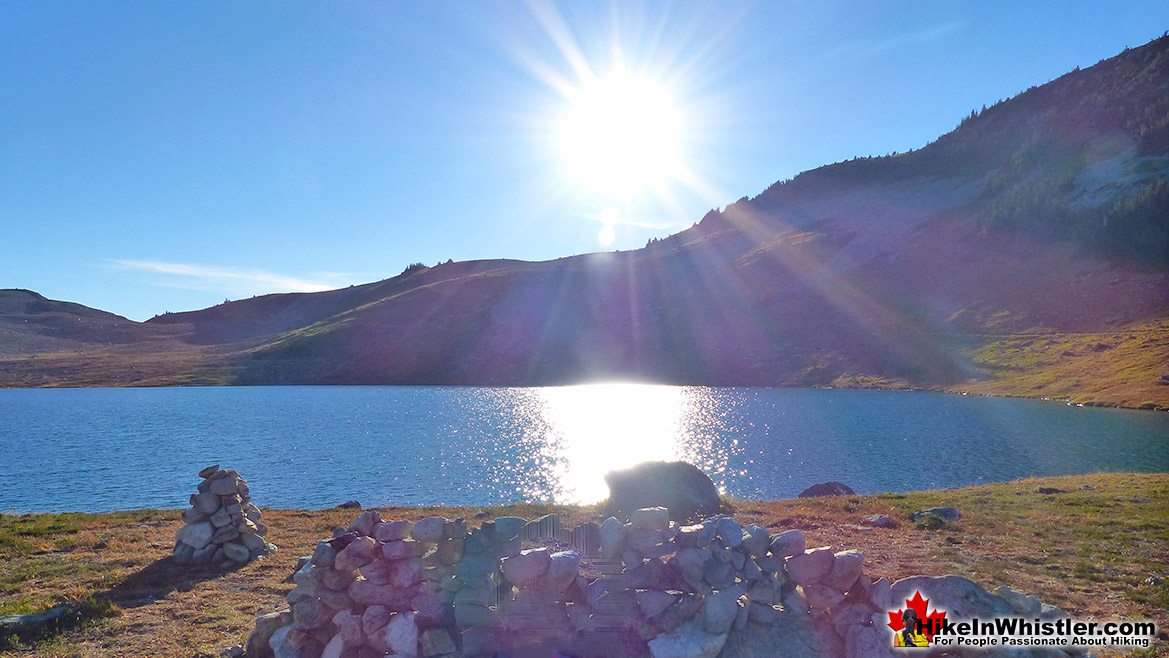
Wedgemount Lake Campground in Garibaldi Park
![]() Camping in Garibaldi Park is generally very good and at Wedgemount Lake the facilities are spectacular. There are 20 designated tent spots and each one with a million dollar view of paradise. Half of these spots are located near the Wedge Hut, up along the dramatic scree, boulder and enormous erratic field about 300 metres from Wedgemount Lake. These tent spots are made of beautiful, wooden tent platforms and arranged to maximize both privacy and view. Nestled in alpine trees about 50 metres up the slope from the hut, three wooden tent platforms hide. Closer to the hut, nestled in the massive erratics are three more platforms. The more you explore among the gnarled and dramatically beautiful krummholz, the more perfectly positioned tent platforms you find. Down at the shore of Wedgemount Lake, just across from the foot of the glacier are several wood framed, gravel tent platforms lined majestically along the shore. Strategically positioned to line your tent view directly across the lake to the breathtaking Wedgemount Glacier. The wonderful silence broken only by distant waterfalls and the occasional rock slide from across the lake. The foot of Wedgemount Glacier is just a short walk away.
Camping in Garibaldi Park is generally very good and at Wedgemount Lake the facilities are spectacular. There are 20 designated tent spots and each one with a million dollar view of paradise. Half of these spots are located near the Wedge Hut, up along the dramatic scree, boulder and enormous erratic field about 300 metres from Wedgemount Lake. These tent spots are made of beautiful, wooden tent platforms and arranged to maximize both privacy and view. Nestled in alpine trees about 50 metres up the slope from the hut, three wooden tent platforms hide. Closer to the hut, nestled in the massive erratics are three more platforms. The more you explore among the gnarled and dramatically beautiful krummholz, the more perfectly positioned tent platforms you find. Down at the shore of Wedgemount Lake, just across from the foot of the glacier are several wood framed, gravel tent platforms lined majestically along the shore. Strategically positioned to line your tent view directly across the lake to the breathtaking Wedgemount Glacier. The wonderful silence broken only by distant waterfalls and the occasional rock slide from across the lake. The foot of Wedgemount Glacier is just a short walk away.
Wedgemount Lake is one of the most spectacular hikes in Garibaldi Park. Though it is a relentlessly exhausting, steep hike, it is mercifully short at only 7 kilometres one way. The elevation gain in that short distance is over 1200 metres which makes it a much steeper hike than most other Whistler hiking trails. Compared with other Whistler hikes, Wedgemount Lake is half the roundtrip distance of either Black Tusk or Panorama Ridge, for example, at 13.5 kilometres and 15 kilometres respectively one way. Wedgemount Lake itself is a magnificent destination for a day hike or spectacular overnight beneath the dazzling mountain peaks and stars. Many sleep under the stars on one of the many beautiful tent platforms that dot the landscape. Solidly built, wooden tent platforms are everywhere you look at Wedgemount Lake. Strategically positioned, these platforms manage to maintain an amazingly secluded feel despite their numbers. In all Wedgemount Lake has 20 of these tent areas. Most are wooden, but several down by the lake shore are gravel, yet every bit as nice.
At a fast hiking pace you can reach Wedgemount Lake from the trailhead in just an hour and a half but at a leisurely or backpack laden pace you will likely take over two hours. The trail is well marked and well used. The steepness of the trail doesn't require any technical skill, however that last kilometre before the lake you will be scrambling on all fours quite a bit. The elevation gain makes a tremendous difference when carrying a heavy backpack and unprepared for the exertion. There is hardly a section of the trail that is not steeply uphill. The first 15 minutes takes you into the deep forest as you run along Wedgemount Creek. This crashing creek can be heard from quite a distance and gives you a hint of the steepness of the trail to come. The source of Wedgemount Creek is of course Wedgemount Lake which tumbles down almost 300 metres in the spectacular, though tricky to get a good look at, Wedgemount Falls. You will be able to see Wedgemount Falls around the 5 kilometre mark along the trail. It is far off to the right in the distance. Despite the distance, you will hear it loud and clear and some easy to find and get to areas off the trail give amazing views of it.
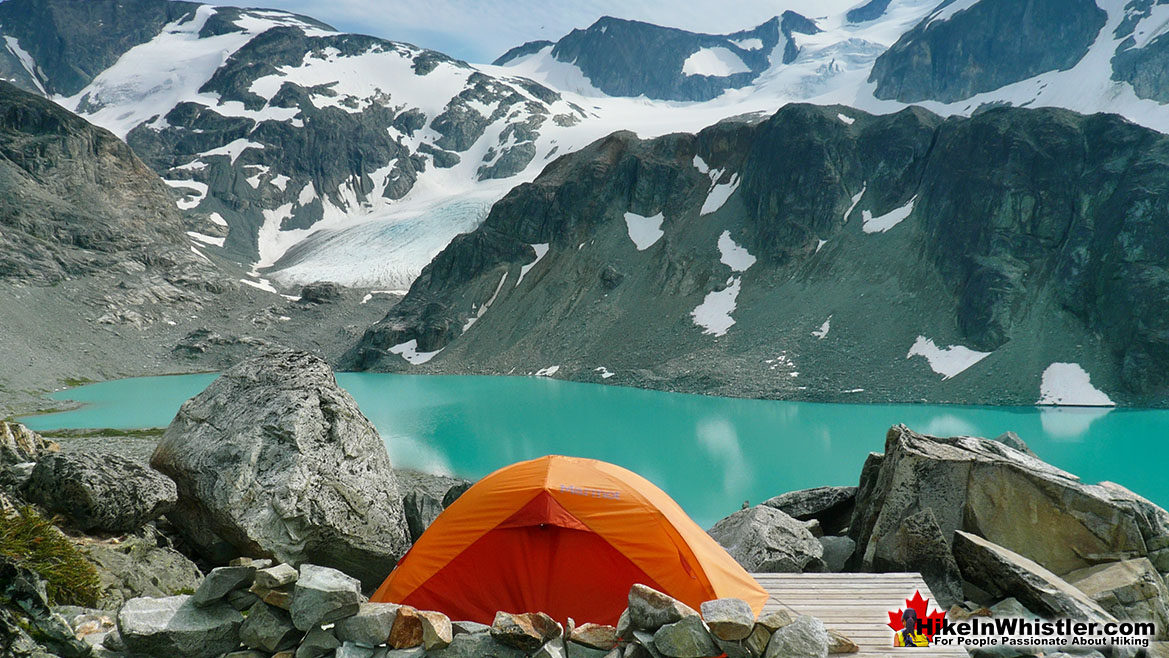
One of the defining features of Garibaldi Park, and Wedgemount Lake in particular, is the staggering number of branching hikes from the main destination of the lake itself. For many, Wedgemount Lake and the Wedge Hut is the base for hikes to Wedge Mountain, Mount Cook, Mount Weart, Mount Moe, Mount James Turner and Mount Currie in Pemberton, crossing glaciers such as Wedgemount Glacier, Weart Glacier, Armchair Glacier, Mystery Glacier and the Needles and Chaos Glacier to name a few. Dozens of unforgettable peaks can be reached from this quiet little hut overlooking this perfect, turquoise lake. In short, if you were to design a paradise in the mountains, Wedgemount Lake would be the standard to which all others would pale. The sheltered valley, beautiful turquoise lake, wonderfully huge glacier across the valley and brutally jagged mountains all around all contribute to making Wedgemount Lake something special. It's challenging and exhausting to hike to and an absolute paradise to relax in. Down by the lakeside you can actually find two recliner chairs, built out of the rocks by the lake. Such a perfect way to enjoy the sun rising over the not-so-distant glacier across the lake.
The Wedge Hut at Wedgemount Lake
![]() The hut at Wedgemount Lake is a wonderful thing. Built by the BC Mountaineering Club in 1970, and since donated to Garibaldi Park, it is free to use by anyone, however you still have to pay the overnight camping fee of $10 per person, per night. It's cozy with two large tables and a loft. Often, during busy times you will find the tables used as beds, a couple on the floor and four people up in the loft. The Wedge Mountain hut is positioned in a spectacular part of the world. High up overlooking Wedgemount Lake. In the massive shadow of Wedge Mountain, the highest mountain in the Garibaldi Ranges. It's a cozy and compact little house in the middle of the carnage of massive rocks, erratics left over the centuries by glaciers and rock slides. Back in the late 60's the British Columbia Mountaineering Club went forward with building five huts in the Coast Mountains of BC. Two of the five were built in Garibaldi Park, they were The Russet Lake hut in 1968 and the Wedgemount Lake hut in 1970. Because structures like these cannot be owned as they are in BC Parks, they are open for use by anyone. There are two large wooden tables along the left and right walls and a little window across from the door. On entering you notice a ladder going straight up to the loft. Everything is bare, weathered wood, but tidy and secure. It's simply a nice, solid, secure little house in a hostile wasteland of beauty. As you walk in you notice right away a feeling of warmth hits you. The Wedge Hut is as wonderful thing.
The hut at Wedgemount Lake is a wonderful thing. Built by the BC Mountaineering Club in 1970, and since donated to Garibaldi Park, it is free to use by anyone, however you still have to pay the overnight camping fee of $10 per person, per night. It's cozy with two large tables and a loft. Often, during busy times you will find the tables used as beds, a couple on the floor and four people up in the loft. The Wedge Mountain hut is positioned in a spectacular part of the world. High up overlooking Wedgemount Lake. In the massive shadow of Wedge Mountain, the highest mountain in the Garibaldi Ranges. It's a cozy and compact little house in the middle of the carnage of massive rocks, erratics left over the centuries by glaciers and rock slides. Back in the late 60's the British Columbia Mountaineering Club went forward with building five huts in the Coast Mountains of BC. Two of the five were built in Garibaldi Park, they were The Russet Lake hut in 1968 and the Wedgemount Lake hut in 1970. Because structures like these cannot be owned as they are in BC Parks, they are open for use by anyone. There are two large wooden tables along the left and right walls and a little window across from the door. On entering you notice a ladder going straight up to the loft. Everything is bare, weathered wood, but tidy and secure. It's simply a nice, solid, secure little house in a hostile wasteland of beauty. As you walk in you notice right away a feeling of warmth hits you. The Wedge Hut is as wonderful thing.
Wedge Mountain is a very difficult scramble from the Wedgemount Lake hut up steep boulder fields, long glacier and the narrowly abrupt ridge to the summit of Wedge. Elevation gain is 1300 metres from the Wedgemount Lake hut! Allow 6 or 7 hours hut to hut and make sure you know what you are doing. Wedge Mountain is a very popular summit to achieve as it is the highest mountain in all of Garibaldi Park and the Garibaldi Ranges. It's quite daunting as to reach it you have to make your way along the spectacular wedge-shaped spine that gives it its name. The Wedge-Weart Col is possibly the easiest hike from Wedgemount Lake. It is a long scramble through the boulder strewn terrain to the Wedge Glacier, then a long ascent up Wedgemount Glacier. It is deceptively far so allow 5 hours roundtrip, hut to hut. Mount Cook is a relatively easy hike from Wedgemount Lake. It is a relatively easy and even partly marked and worn trail leading to a scramble up the logical ascent of Mount Cook. Tremendous views of Wedgemount Lake and surrounding mountains from the summit. It is a long and challenging scramble up steep boulder fields along a partly marked, though easy to lose trail.
Mount Weart is probably the most popular of the branching hikres fom Wedgemount Lake. This is because of its extraordinarily beautiful views from its summit. It is quite difficult and some tricky route finding is involved as you leave Wedgemount Glacier for the Weart ascent. But you will have trouble finding more beautiful views from another peak in the area. It is a difficult and long scramble from the Wedgemount Lake hut and a considerable elevation gain of 780 metres from the Hut. Give yourself at least four hours roundtrip, hut to hut. Fees: $12 Adult, $6 Kids (6-15).. Reservations are site-specific to the campground but not to individual tent pads (first-come, first-served upon arrival). Book online at https://camping.bcparks.ca/ or by phone at 1-800-689-9025 (toll-free in Canada/U.S.) or 1-519-858-6161 (international).
Elfin Lakes Campground in Garibaldi Park
![]() Back down in the southern end of Garibaldi Park are the campsites at and near Elfin Lakes. Elfin Lakes campsite has 35 tent pads and the huge and inviting Elfin Lakes hut has 33 bunk spots! Elfin Lakes in Garibaldi Park is an absolutely phenomenal, though long, hiking, biking, snowshoeing and skiing trail that begins at the Diamond Head area in Squamish. From Whistler Village, the trailhead is just over an hours drive away, located near the south end of Garibaldi Provincial Park. The trail to Elfin Lakes starts out ascending through deep forest, reaching the Red Heather Hut after 5 kilometres. This is a small warming hut equipped with a wood stove complete with a stack of wood free to use, though sleeping here is for emergencies only. The final 6 kilometres from this hut to Elfin Lakes takes you along a beautiful ridge with amazing views of snowy mountains all around. The sheer distance of this snowshoeing trail ranks it as difficult, though overall you will just be doing a moderately steady ascending trail. Expect to take four hours to reach the Elfin Lakes ut as you are almost constantly ascending a gradual, though consistently uphill trail. There are several jaw-dropping views along this final 6 kilometre stretch. This trail is so well marked with orange poles and tree markers that you can reliably find your way after dark or before sunrise with good lights to assist you. You often see, with some shock, skiers trudging up the trail, not far from the trailhead after the sun has set. Making their way to the Elfin Lakes hut in the dead of night seems to be a pastime of quite a few local skiers and boarders.
Back down in the southern end of Garibaldi Park are the campsites at and near Elfin Lakes. Elfin Lakes campsite has 35 tent pads and the huge and inviting Elfin Lakes hut has 33 bunk spots! Elfin Lakes in Garibaldi Park is an absolutely phenomenal, though long, hiking, biking, snowshoeing and skiing trail that begins at the Diamond Head area in Squamish. From Whistler Village, the trailhead is just over an hours drive away, located near the south end of Garibaldi Provincial Park. The trail to Elfin Lakes starts out ascending through deep forest, reaching the Red Heather Hut after 5 kilometres. This is a small warming hut equipped with a wood stove complete with a stack of wood free to use, though sleeping here is for emergencies only. The final 6 kilometres from this hut to Elfin Lakes takes you along a beautiful ridge with amazing views of snowy mountains all around. The sheer distance of this snowshoeing trail ranks it as difficult, though overall you will just be doing a moderately steady ascending trail. Expect to take four hours to reach the Elfin Lakes ut as you are almost constantly ascending a gradual, though consistently uphill trail. There are several jaw-dropping views along this final 6 kilometre stretch. This trail is so well marked with orange poles and tree markers that you can reliably find your way after dark or before sunrise with good lights to assist you. You often see, with some shock, skiers trudging up the trail, not far from the trailhead after the sun has set. Making their way to the Elfin Lakes hut in the dead of night seems to be a pastime of quite a few local skiers and boarders.
Camping at Elfin Lakes is an amazingly beautiful experience. The valley is huge with stunning mountain peaks all around. The hiking/snowshoeing possibilities seem endless. Year-round the Elfin Lakes hut has bunk beds for 33 people(11 double bunks and 12 single bunks). The hut also has 4 huge picnic tables inside as well as 2 propane stove-top burners, a washing sink as well as a giant propane stove and solar powered lights. Adjacent to the hut is a row of outhouses. The campsite area at Elfin Lakes is quite large and well organized. 35 tent platforms dot the landscape and on a typical summer weekend, you will find most of them occupied! In the winter months, these tent platforms with be hidden under metres of snow and you can put up a tent nearly anywhere you want. There are various excellent spots overlooking the vast valley just a few dozen metres from the hut. For those seeking solitude, there are endless tent site possibilities further away. Fees: $12 Adult, $6 Kids (6-15). Campsite fees must be paid online in advance at the BC Parks Garibaldi Provincial Park reservations page.
Elfin Lakes Hut in Garibaldi Park
![]() If you are driving the Sea to Sky Highway to Whistler, Garibaldi Park will be the vast wilderness of snow-capped mountains on your right. The Elfin Lakes trail is very well marked and maintained and leads to the wonderful, Elfin Lakes hut. This amazing hut sleeps 33 and is solar powered and propane heated. There is a charge of $15/person(payable online) to stay the night there which is a small price to pay for the beautiful comfort after the long, 11 kilometre snowshoe or hike to get there. This area is very popular with skiers as well as snowshoers in the winter and deep snow covers the trail usually from November to June. Elfin Lakes has been a popular destination for hiking, snowshoeing and skiing for almost a century. In the 1930's Ottar and Emil Brandvold immigrated to Canada from Norway. Hearing of the wilderness paradise in the Garibaldi region they combed the area for a suitable location to build an alpine lodge. Joined by Ottar's future wife, Joan Mathews of West Vancouver, they decided on Diamond Head, next to the two small lakes to build their dream lodge. Emil, Ottar and Joan built Diamond Head Lodge by hand using the forest surrounding what would become known as Elfin Lakes.
If you are driving the Sea to Sky Highway to Whistler, Garibaldi Park will be the vast wilderness of snow-capped mountains on your right. The Elfin Lakes trail is very well marked and maintained and leads to the wonderful, Elfin Lakes hut. This amazing hut sleeps 33 and is solar powered and propane heated. There is a charge of $15/person(payable online) to stay the night there which is a small price to pay for the beautiful comfort after the long, 11 kilometre snowshoe or hike to get there. This area is very popular with skiers as well as snowshoers in the winter and deep snow covers the trail usually from November to June. Elfin Lakes has been a popular destination for hiking, snowshoeing and skiing for almost a century. In the 1930's Ottar and Emil Brandvold immigrated to Canada from Norway. Hearing of the wilderness paradise in the Garibaldi region they combed the area for a suitable location to build an alpine lodge. Joined by Ottar's future wife, Joan Mathews of West Vancouver, they decided on Diamond Head, next to the two small lakes to build their dream lodge. Emil, Ottar and Joan built Diamond Head Lodge by hand using the forest surrounding what would become known as Elfin Lakes.
The name Elfin Lakes is suspected to have come much later. One record indicates the lakes were once called Crystal Lakes. The earliest indication they were named Elfin Lakes comes from the pamphlet from the Diamond Head Lodge in 1978. Since 1978 the lakes have been known as Elfin Lakes. For thirty years, beginning in the late 1940's the Diamond Head Lodge hosted visitors from around the world. Year-round visitors enjoyed the breathtaking scenery and rugged hospitality. In 1958 the Diamond Head Lodge was bought by the Provincial Government and leased back to the Brandvold's. The Brandvold's continued to operate the lodge until their retirement in 1972. In 1973 the lodge was permanently closed and in 1974 the Elfin Lakes hut was built to replace the deteriorating lodge. In 2009 the crumbling remains of the Diamond Head Lodge were removed. One corner of this beautiful and cherished building still remain as a tribute to the Brandvold's contribution to the history of this wonderful place.
The Elfin Lakes campground is located in an incredibly beautiful area of distant, enormous, jagged mountains and beautiful rolling hills and valleys. The two cute little lakes lay next to the amazing Elfin Lakes hut. To snowshoe to this hut is quite something. As you approach it in winter it looks quite small, buried as it invariably is in metres of snow. The entrance is reached by descending a snow staircase. Upon entering you feel an unexpected wave of heat as you realize the hut is heated. There are also propane stoves and very unexpectedly, working lights. The Elfin Lakes hut is solar powered. Amazing. Stairs lead up to a impressively large sleeping area which can accommodate 33 people. A fact you would have never believed from your approach view outside. Not only can it sleep 33, but it does so in style. Beautifully organized, solid looking, wooden bunk beds built right into the structure make the hut look like some characteristically beautiful, European ski lodge. What an great place Elfin Lakes is! There are several outhouses next to the Elfin Lakes hut and plenty of beautiful spots in the area to put up a tent. Even in the bitter cold of winter you will see a few tents a few hundred metres from the hut. There is an amazing plateau near the hut that edges onto a sweeping view of the valley below. This is just one of many million dollar view tent sites to be found in this year-round, mountain paradise. Fees: $12 Adult, $6 Kids (6-15) for tent camping; hut fees are $25 per person per night. Campsite fees must be paid online in advance at the BC Parks Garibaldi Provincial Park reservations page.
Rampart Ponds Campground in Garibaldi Park
![]() In 2015, the new campsite at Rampart Ponds was completed. Just 1.5 kilometres before Mamquam Lake, this new campground replaces the old one at Mamquam Lake that was closed recently. It is located 10 kilometres from Elfin Lakes on the trail to Mamquam Lake. The new campground has 12 tent platforms, an outhouse and food storage facilities. Garibaldi Provincial Park is not dog friendly. This is mainly out of respect for the wildlife that frequent the area. There are several great place to hike with your dog in and around Squamish. Alice Lake, Ring and Conflict Lakes and Brew Lake. And in Whistler you should try Whistler Train Wreck, the Sea to Sky Trail, Cheakamus River, Logger's Lake, Joffre Lakes. Bikes are allowed on the main trail from the parking lot to Elfin Lakes only. There are no garbage facilities at Elfin Lakes and you must pack out what you pack in. Open fires are prohibited in the park and camp stoves should be used for all cooking. All motorized vehicles are not permitted in the park, including motorcycles, ATV's and snowmobiles. Fees: $12 Adult, $6 Kids (6-15). Campsite fees must be paid online in advance at the BC Parks Garibaldi Provincial Park reservations page.
In 2015, the new campsite at Rampart Ponds was completed. Just 1.5 kilometres before Mamquam Lake, this new campground replaces the old one at Mamquam Lake that was closed recently. It is located 10 kilometres from Elfin Lakes on the trail to Mamquam Lake. The new campground has 12 tent platforms, an outhouse and food storage facilities. Garibaldi Provincial Park is not dog friendly. This is mainly out of respect for the wildlife that frequent the area. There are several great place to hike with your dog in and around Squamish. Alice Lake, Ring and Conflict Lakes and Brew Lake. And in Whistler you should try Whistler Train Wreck, the Sea to Sky Trail, Cheakamus River, Logger's Lake, Joffre Lakes. Bikes are allowed on the main trail from the parking lot to Elfin Lakes only. There are no garbage facilities at Elfin Lakes and you must pack out what you pack in. Open fires are prohibited in the park and camp stoves should be used for all cooking. All motorized vehicles are not permitted in the park, including motorcycles, ATV's and snowmobiles. Fees: $12 Adult, $6 Kids (6-15). Campsite fees must be paid online in advance at the BC Parks Garibaldi Provincial Park reservations page.
Wilderness Camping Guidelines for Garibaldi Park
![]() All overnight visits to Garibaldi Park require reservations beforehand. In the past camping was allowed only in the designated BC Parks campsites. New in 2018, for the first time you can camp in the vast wilderness beyond the campgrounds. There are several eligibility requirements you must adhere to. Your camp must be at least 2 kilometres from any established trail or campground and your group size must be 10 or less. Your camp must be at least 30 metres from water sources such as a lake, stream or wetland. You and your companions must be experienced wilderness hikers proficient in route finding and preparation. It is stated on the Garibaldi Provincial Park BC Parks site that you should be an experienced mountaineer, climber, ski tourer or possess advanced wilderness skills. You must be committed to the “Leave No Trace” ethos of camping and hiking.
All overnight visits to Garibaldi Park require reservations beforehand. In the past camping was allowed only in the designated BC Parks campsites. New in 2018, for the first time you can camp in the vast wilderness beyond the campgrounds. There are several eligibility requirements you must adhere to. Your camp must be at least 2 kilometres from any established trail or campground and your group size must be 10 or less. Your camp must be at least 30 metres from water sources such as a lake, stream or wetland. You and your companions must be experienced wilderness hikers proficient in route finding and preparation. It is stated on the Garibaldi Provincial Park BC Parks site that you should be an experienced mountaineer, climber, ski tourer or possess advanced wilderness skills. You must be committed to the “Leave No Trace” ethos of camping and hiking.
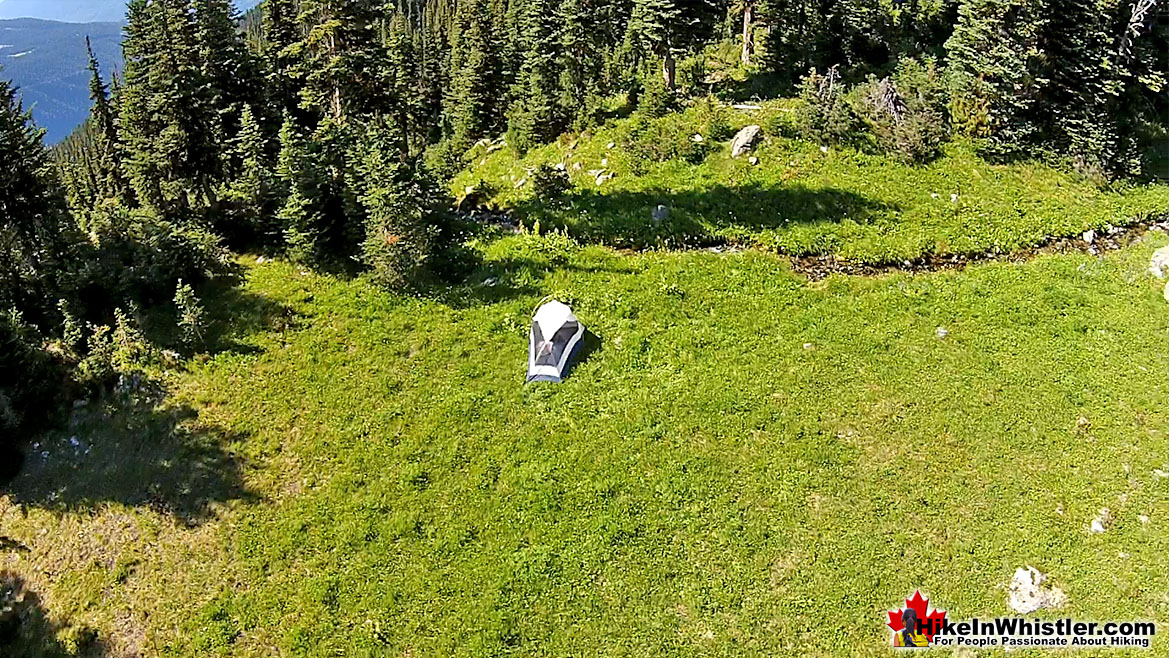
To leave no trace of your visit to Garibaldi Provincial Park, you should adhere to these ideas and practices into your wilderness experience. They are especially important when camping in wilderness and alpine areas to protect the natural environment. Travel and camp on durable surfaces and be sure to leave your camp tidy. Clean your camp when you leave. In wilderness areas, spread use and avoid places where impact is just beginning. Pay particular attention to what you do in and around your campsite; you are camping in and amongst sensitive plants such as heather meadows. These are among the most fragile ecosystems because of the severe conditions and the short growing season. What may seem like a harmless activity can cause long-term damage.
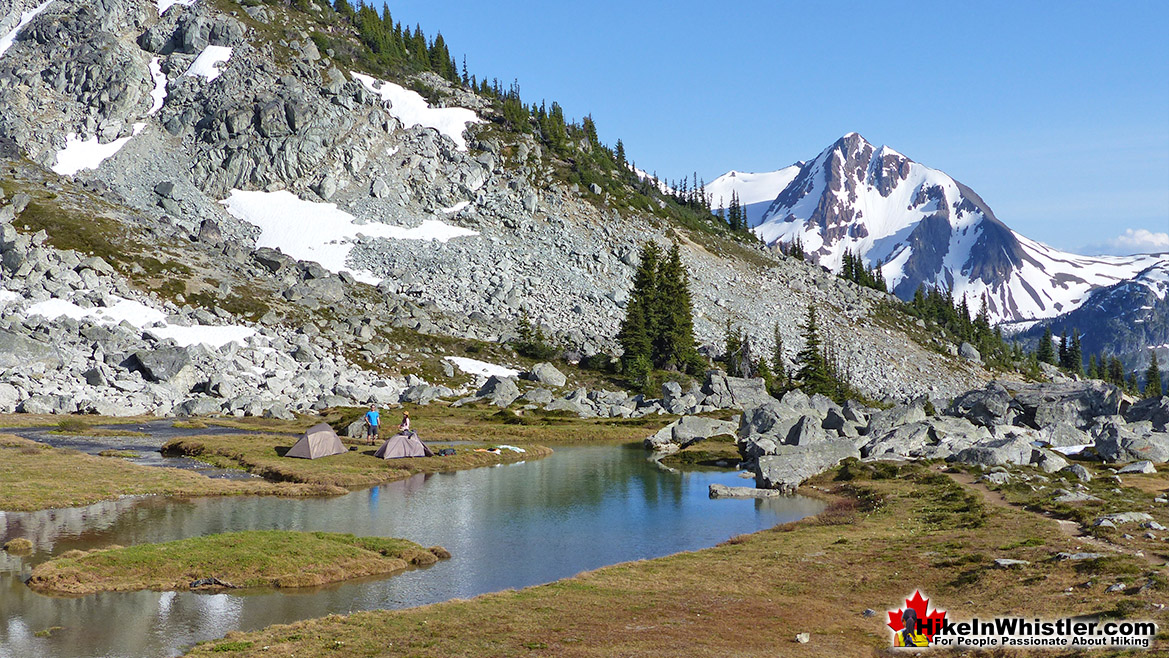
Dispose of all waste properly, pack out all trash and food waste left over from cooking. Bury human waste at least 20 centimetres deep and 70 metres from any water source or wetland. Mix in dirt and cover to disguise the hole. Human waste that cannot be buried in solid ground must be carried out. Pack out all toilet paper — do not burn it. Urinate on the soil surface, away from vegetation and water. Leave all sites as you found them. Do not dig trenches, level sites, or construct tables or chairs. Avoid damaging live trees and plants. Never hammer nails into trees or girdle trunks with tent lines. Leave natural objects and cultural artifacts. All natural and cultural resources such as rocks, antlers, or fossils, pot shards, and projectile points, must be left undisturbed. It is illegal to disturb or collect these resources.
Respect wildlife by observing from a distance. Do not follow, approach, or feed animals. Feeding wildlife damages their health, alters natural behaviors, and exposes them to predators and other dangers. Protect wildlife and your food by storing food and garbage securely. Do your best to avoid wildlife areas during sensitive times: mating, nesting and raising young. Be considerate of other visitors, respect their experience and desire for solitude. Talk quietly in camp and on the trails. Don’t walk through others’ camps. Rest just off the trail on a durable site. Camp away from scenic attractions and water. Please clean up after less thoughtful people who have gone before you.
In addition to this there is an overall wilderness camping zone that denotes permissible zones that you can camp in the wilderness. Consult the Wilderness Camping Map which denotes prohibited camping zones such as the Diamond Head area and approach, Columnar Peak, the Gargoyles, Opal Cone, and Mamquam Lake. Much of the area around Garibaldi Lake, Black Tusk, Panorama Ridge and Mount Price. Cheakamus Lake has a sensitive wetland habitat at the east end of the lake where Cheakamus River flows into the lake. There is a wonderful and very inviting plateau of land above Wedgemount Lake close to the end of the lake where the pours out via Wedgemount Falls. Near Russet Lake where the north-south running UTM 511E forms the boundary for both the south and north sections of the Spearhead Traverse. Wilderness camping is prohibited west of this line. In the south, this line roughly dissects The Fissile and Overlord Glacier east of Russet Lake campground. In the North, UTM 511E dissects the Decker glacier. Wilderness camping reservations/fees cost the same as for the campgrounds. Fees: $12 Adult, $6 Kids (6-15) Campsite fees must be paid online in advance at the BC Parks Garibaldi Provincial Park reservations page.
Whistler Hiking Glossary A to Z
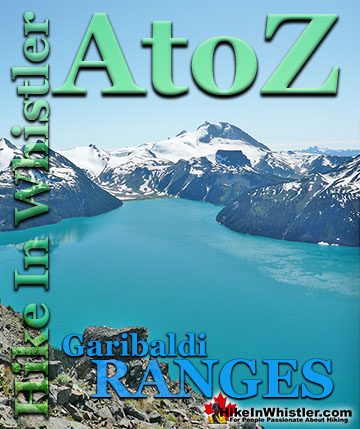
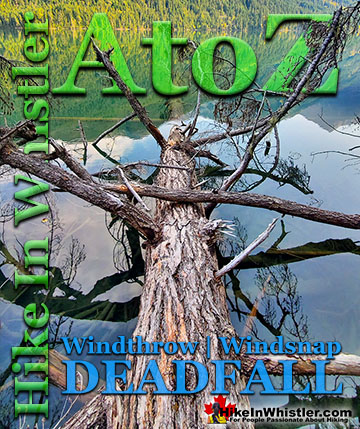
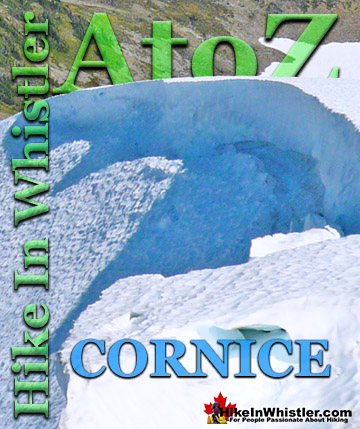
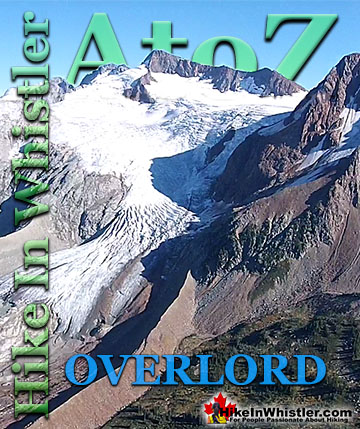

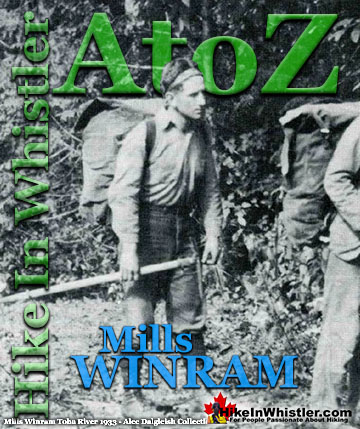
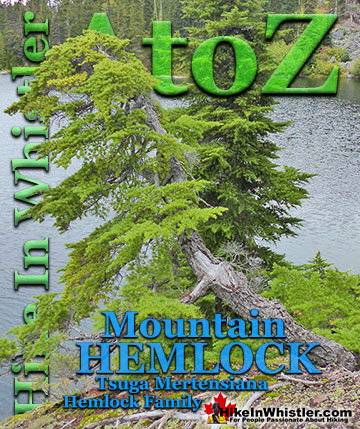
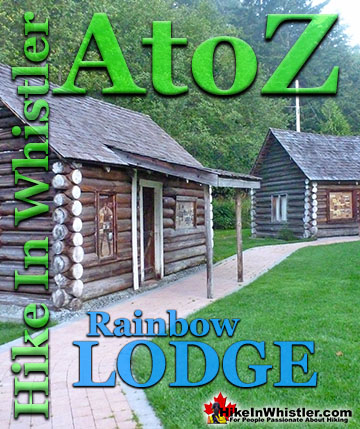
Whistler & Garibaldi Park Best Hiking by Month!
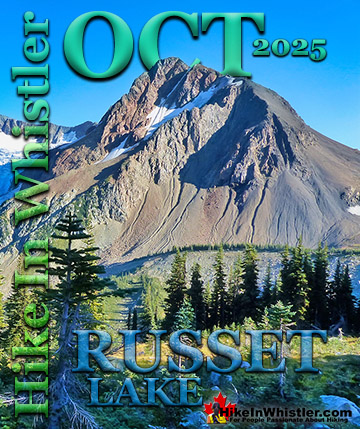
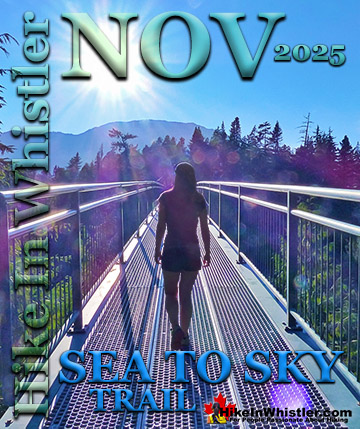
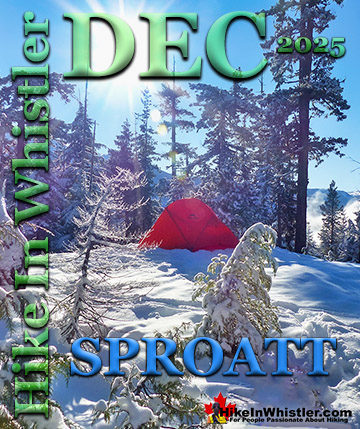
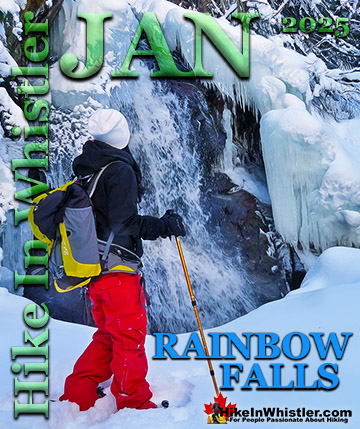
Explore BC Hiking Destinations!
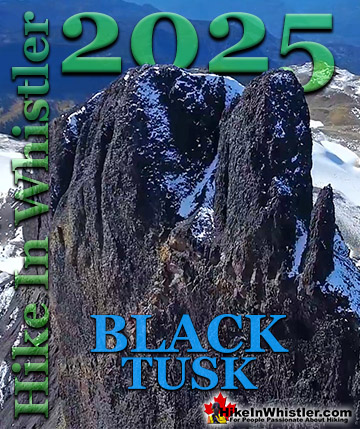
Whistler Hiking Trails
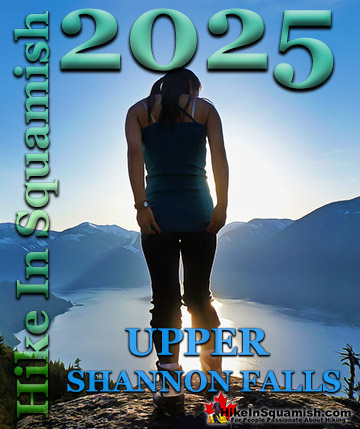
Squamish Hiking Trails
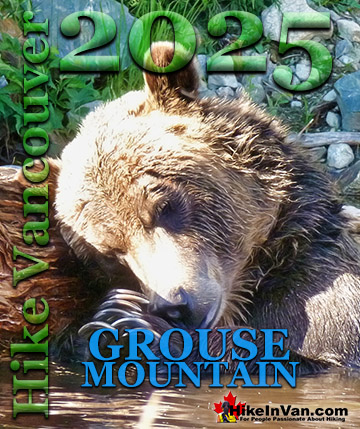
Vancouver Hiking Trails
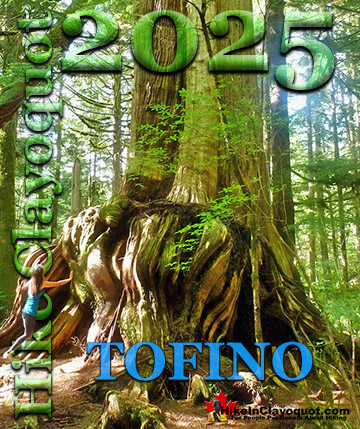
Clayoquot Hiking Trails

Victoria Hiking Trails
